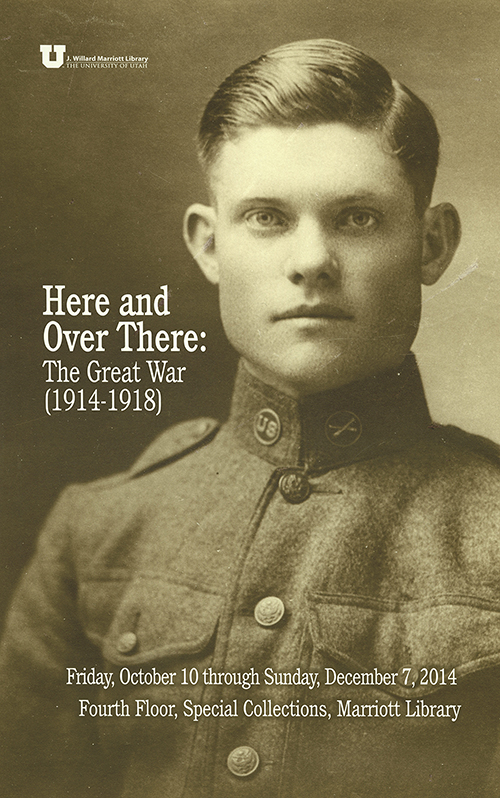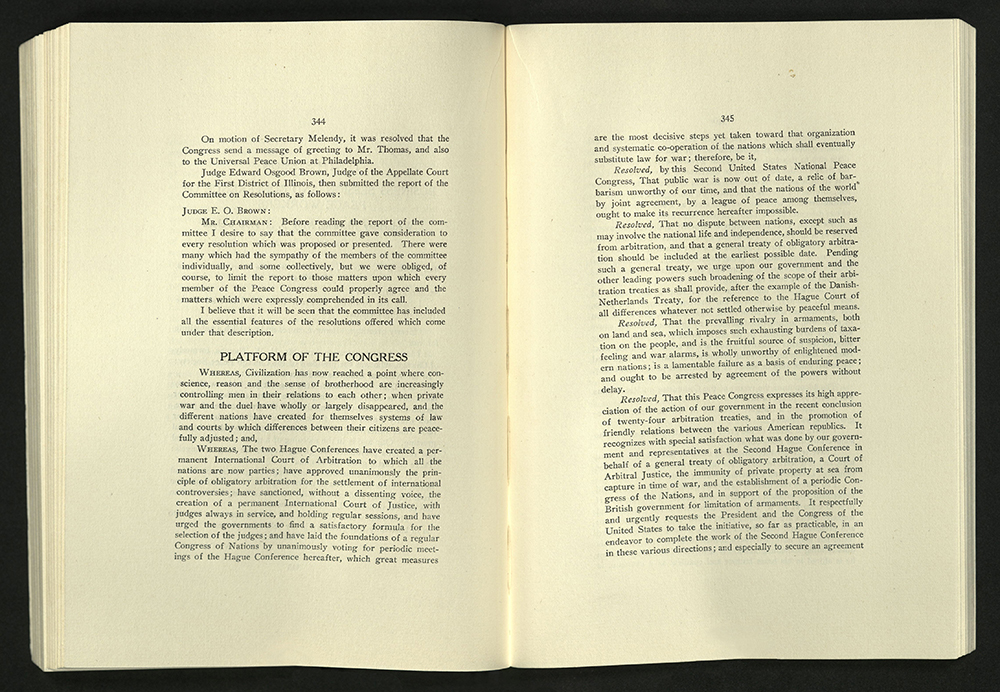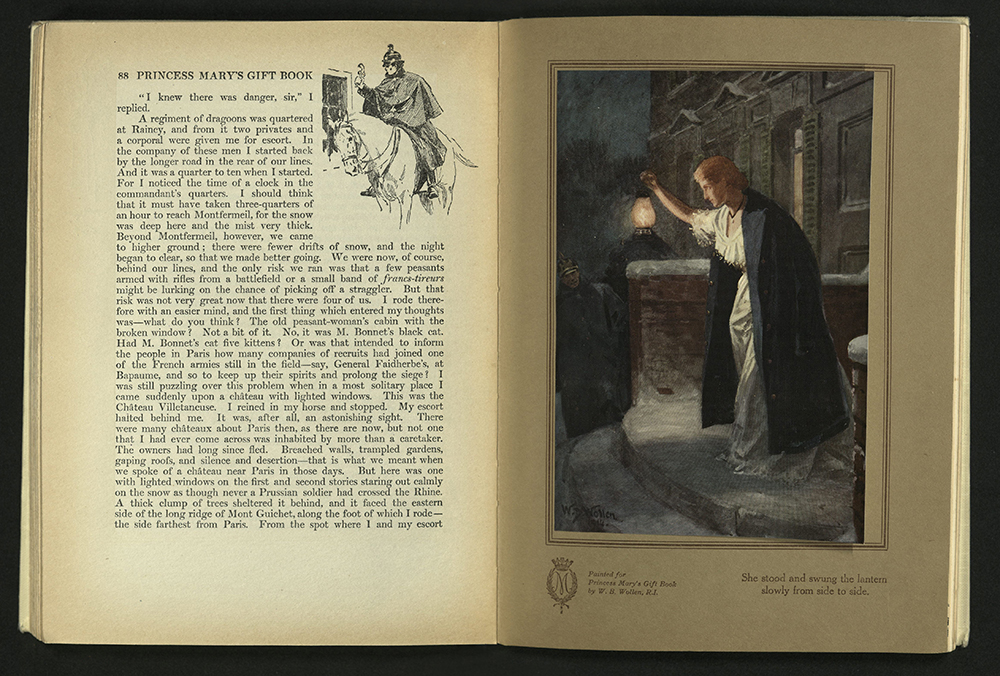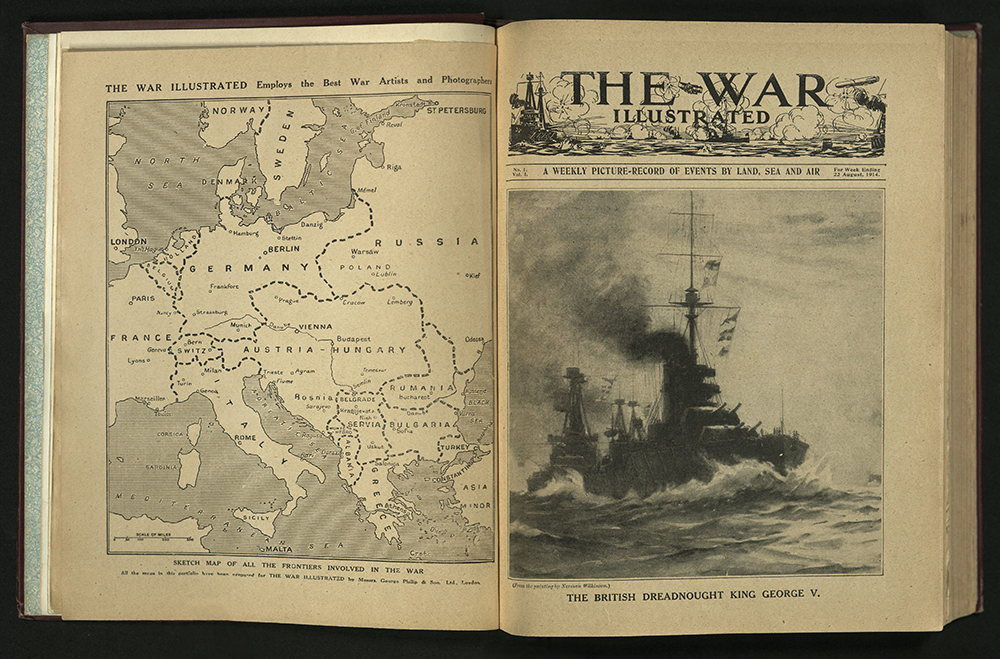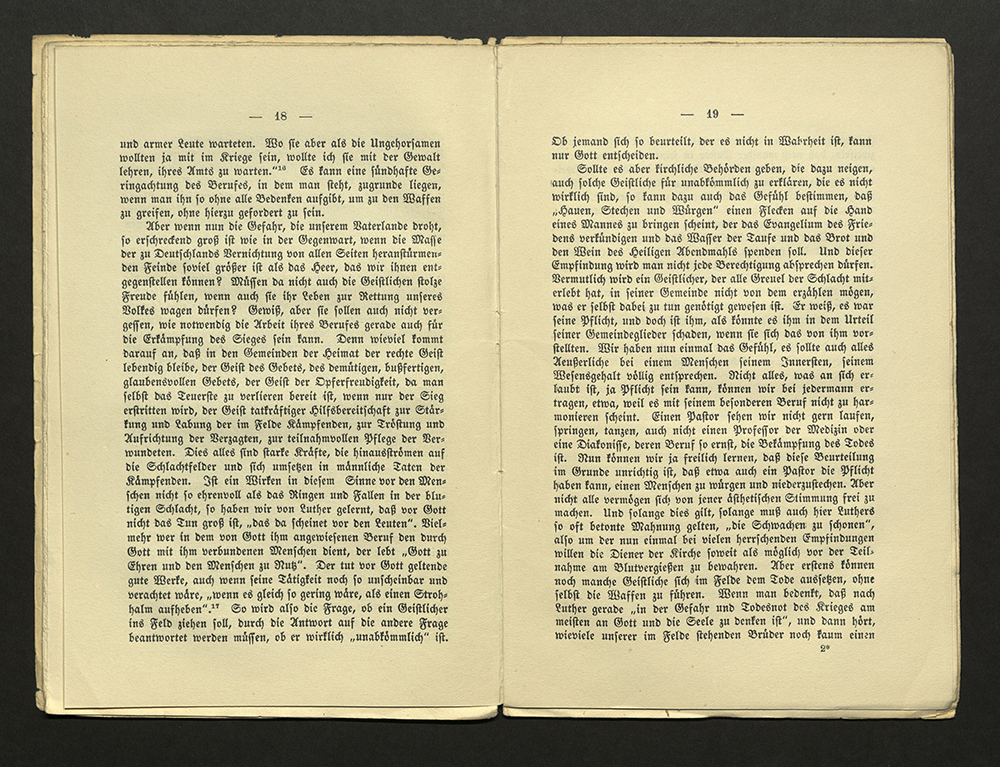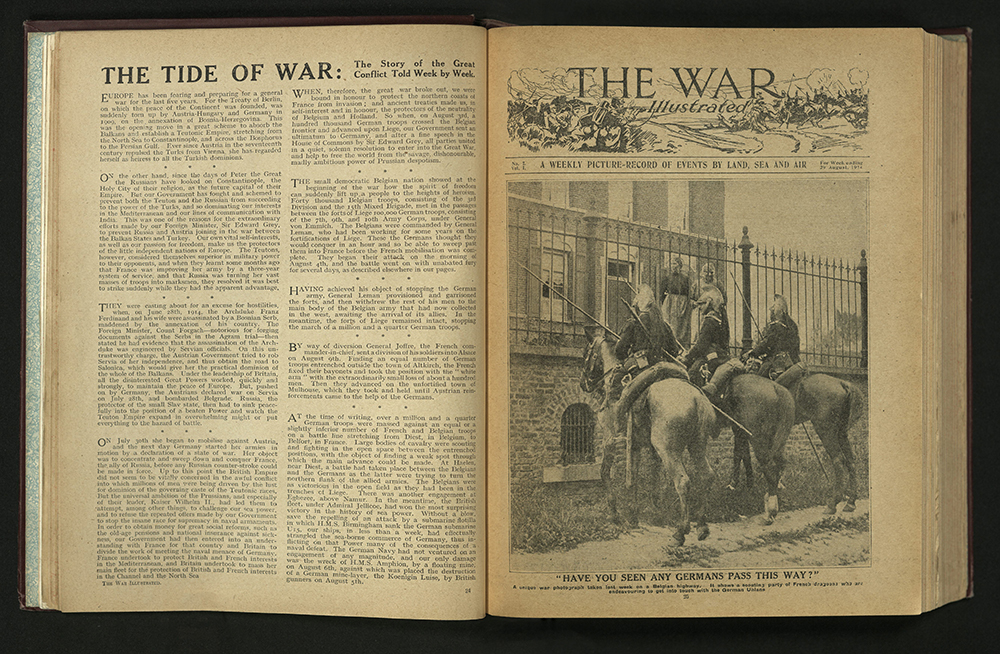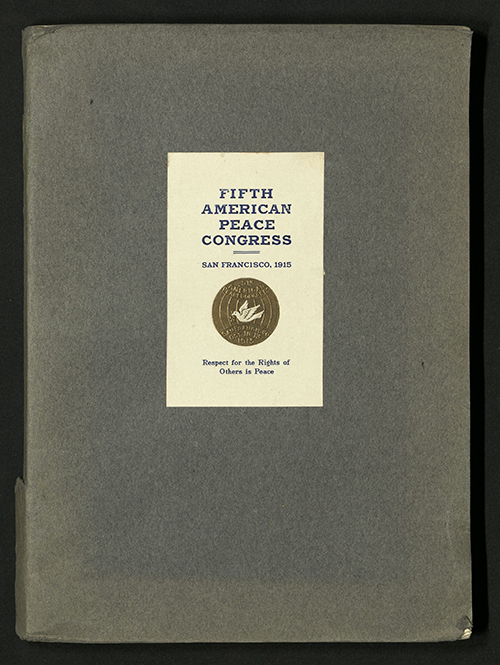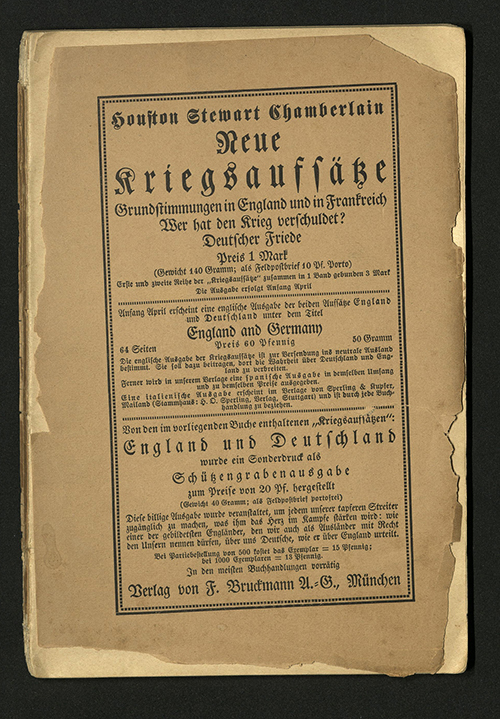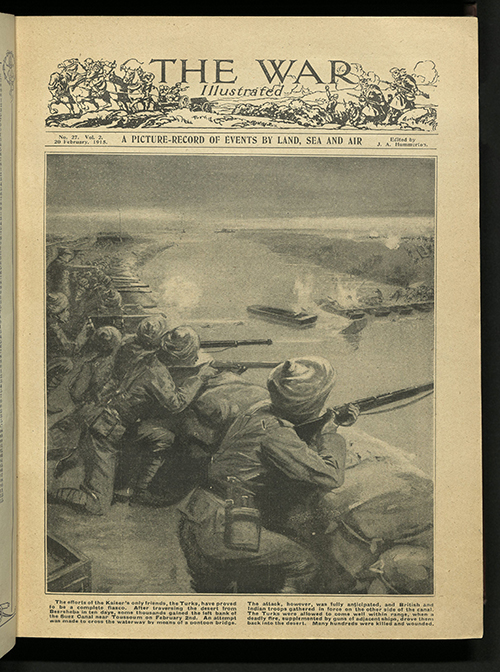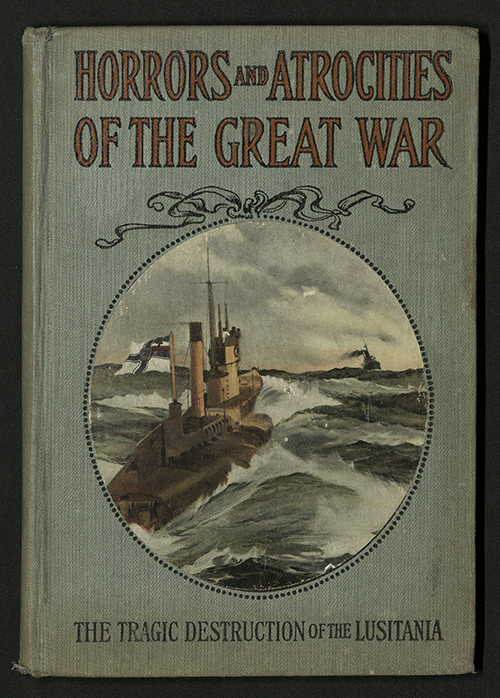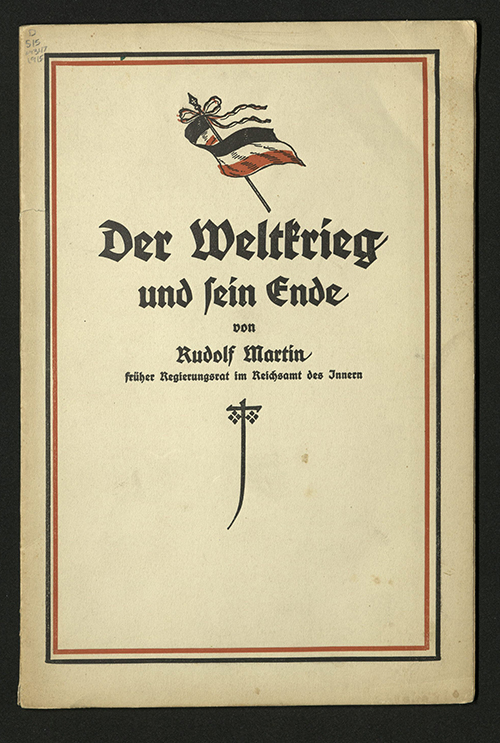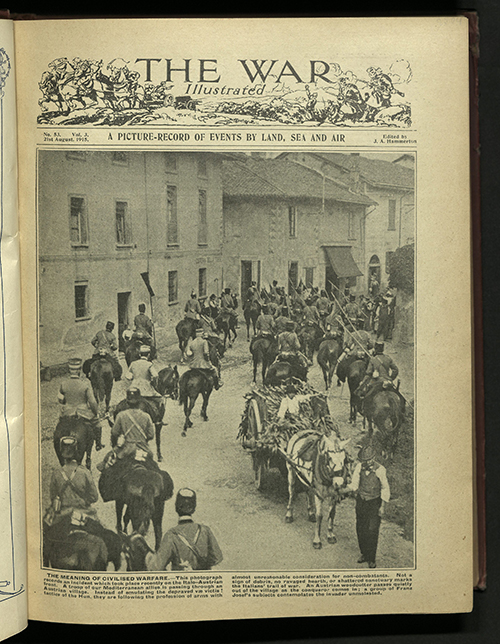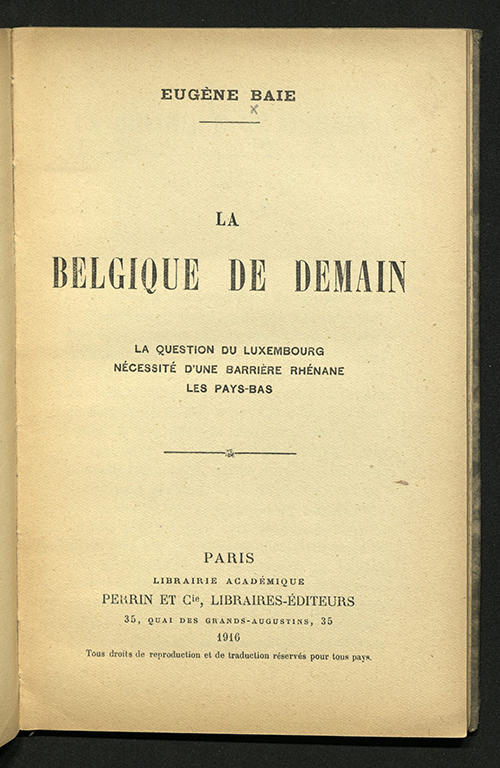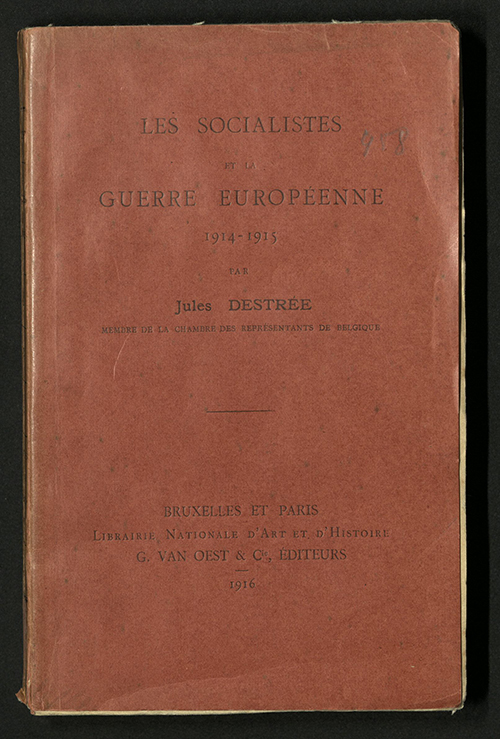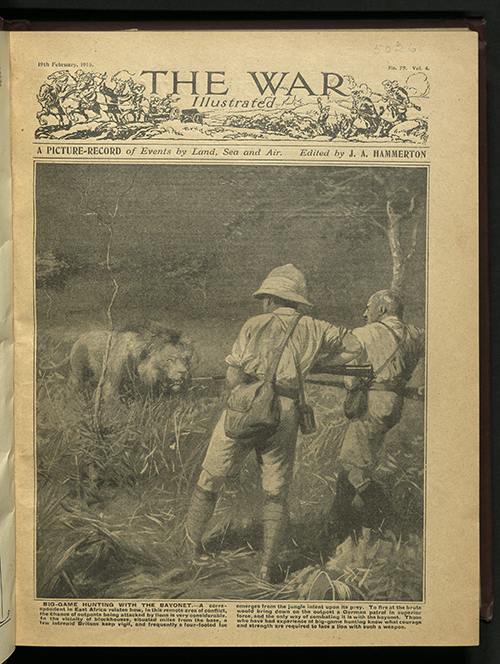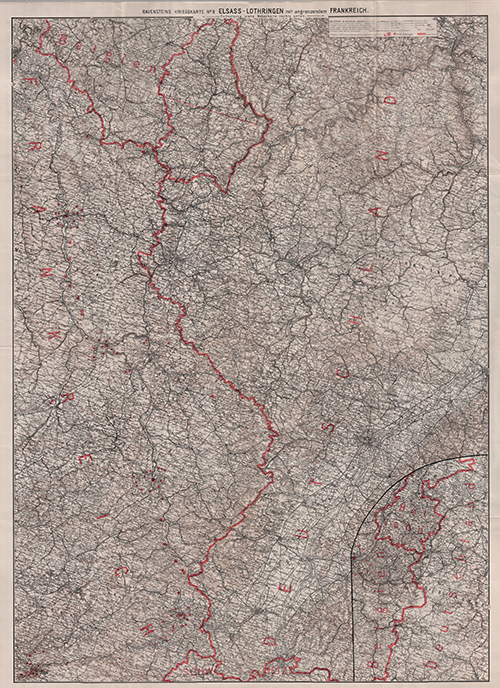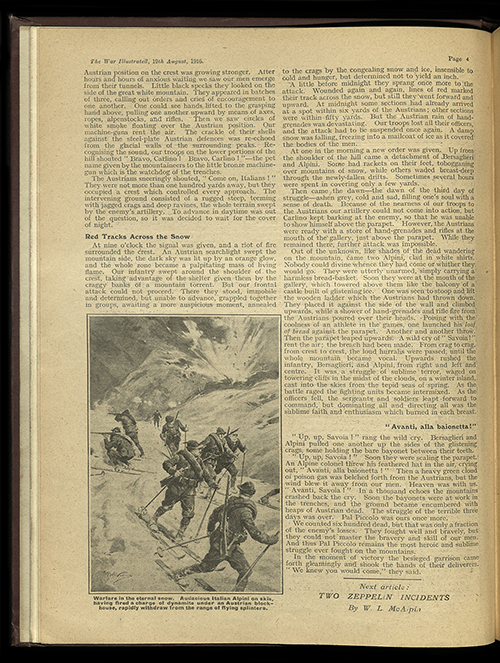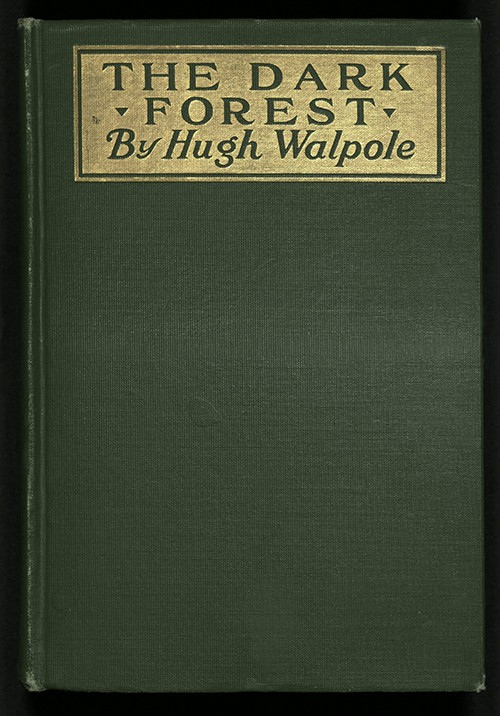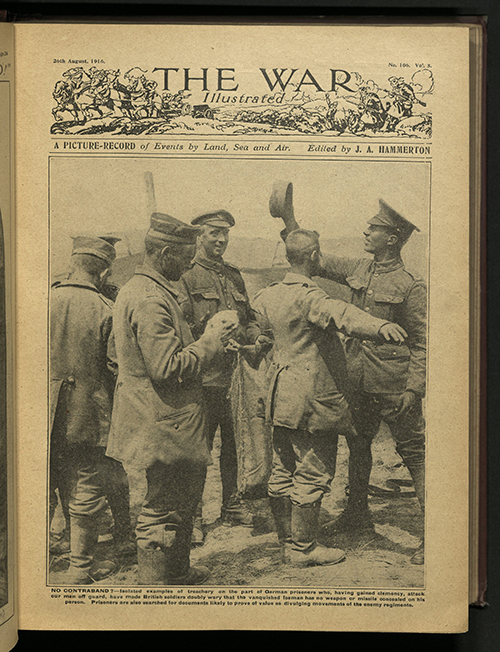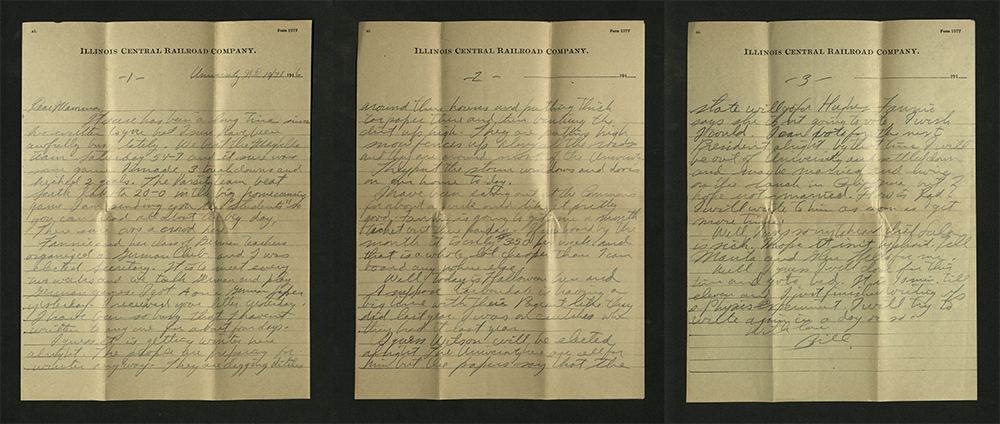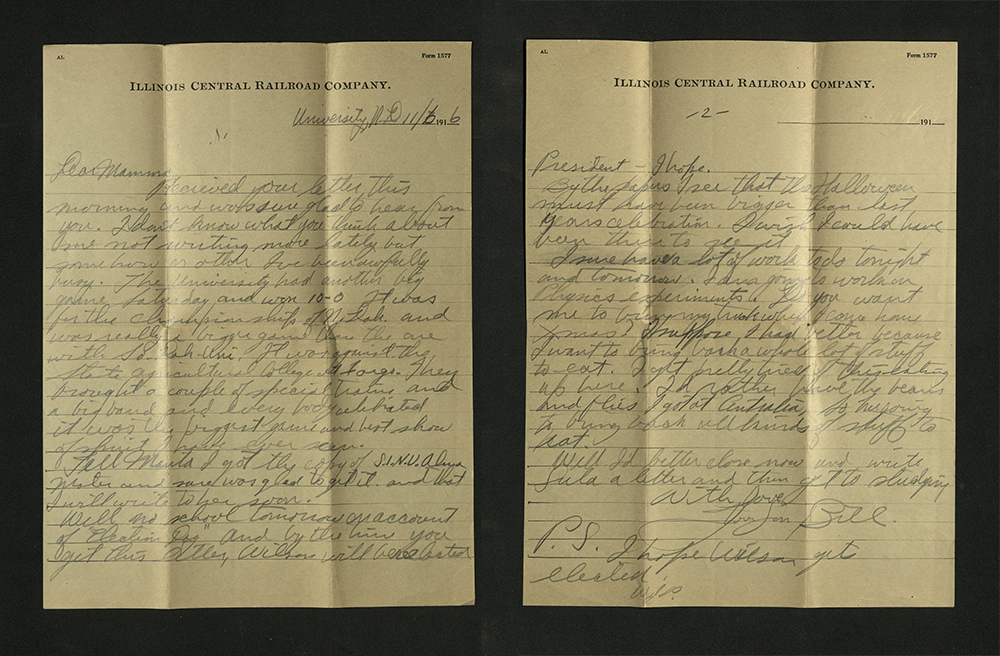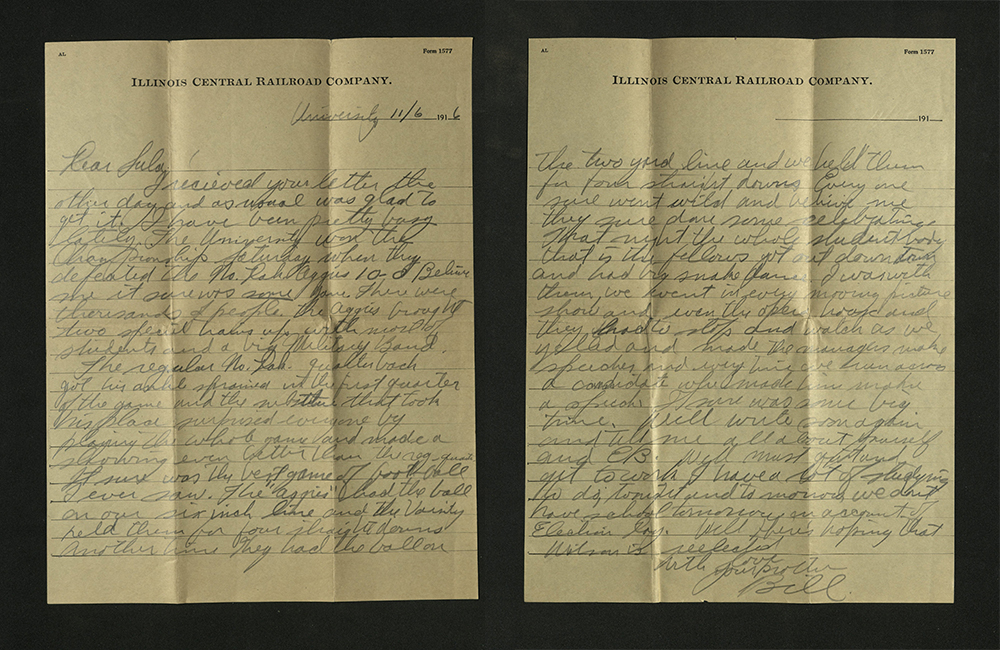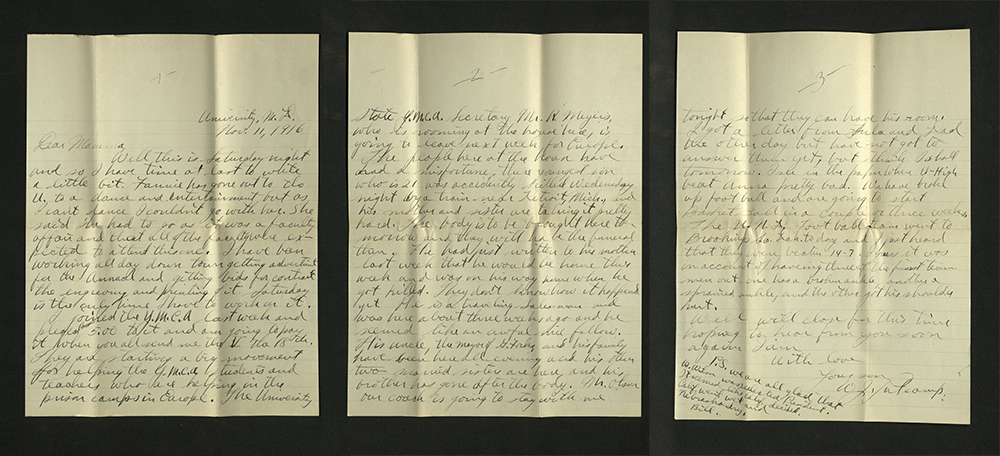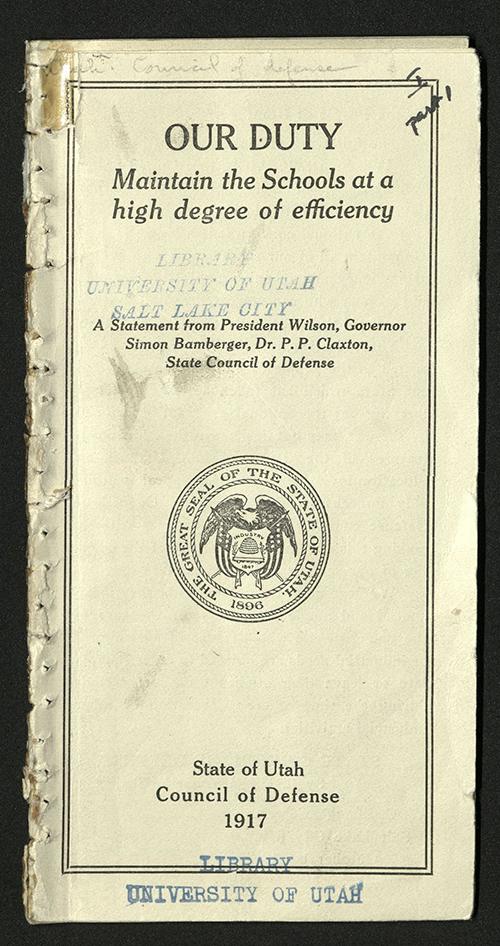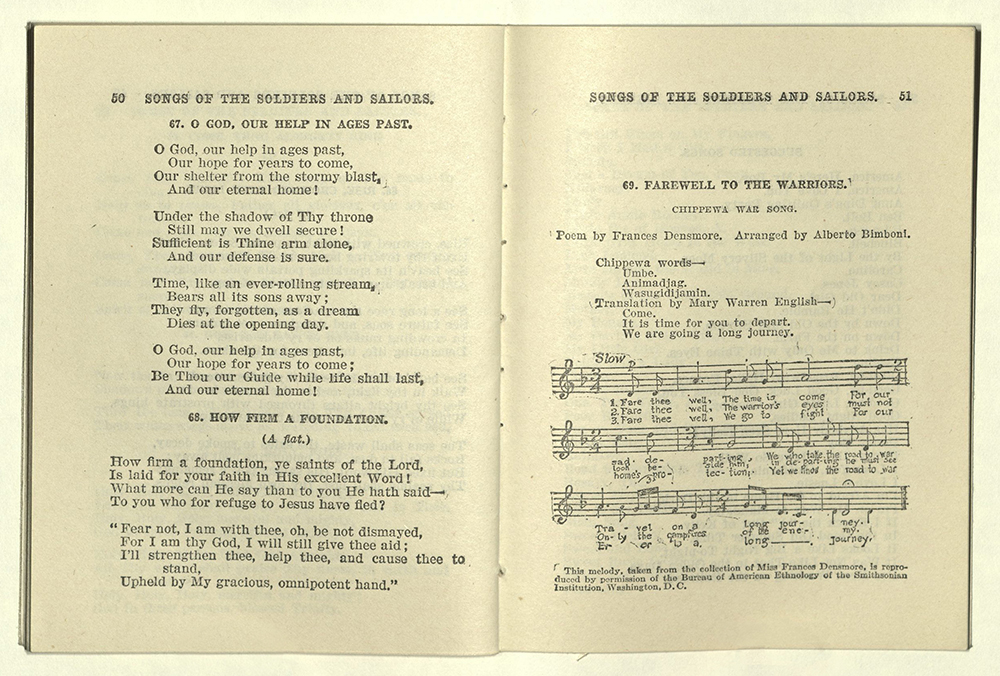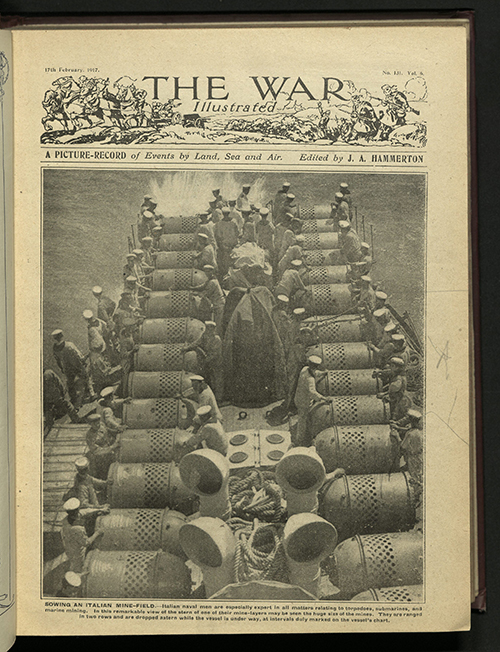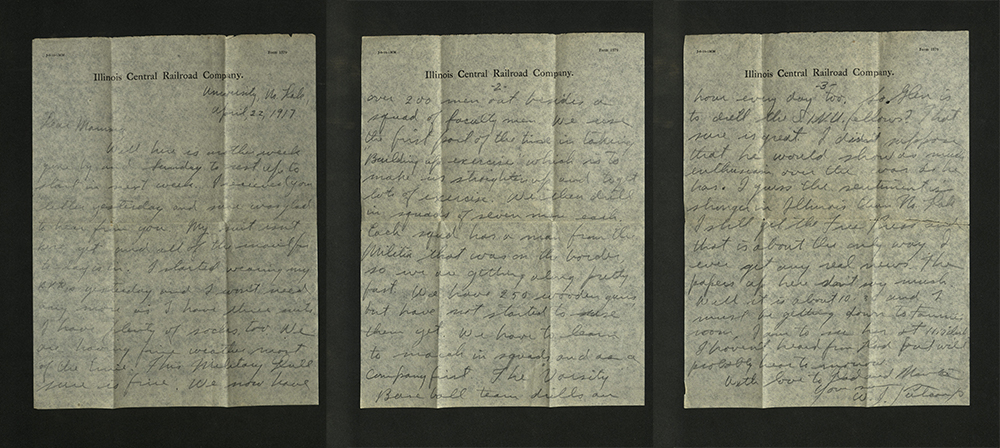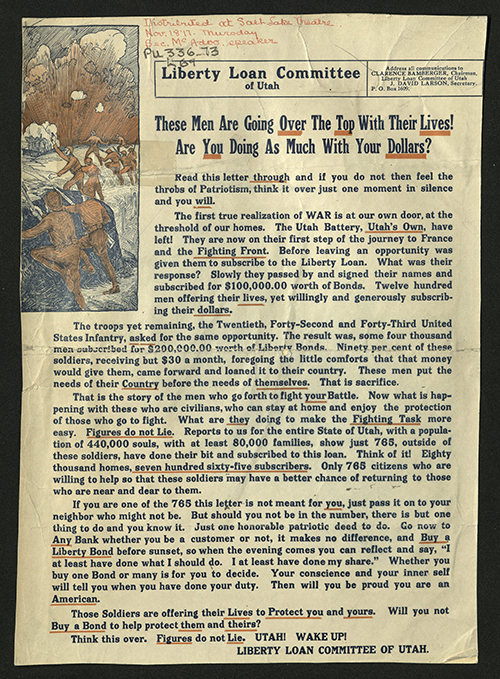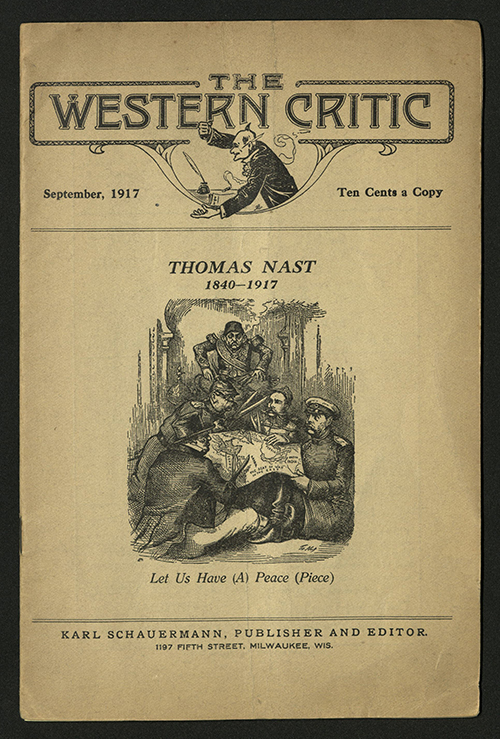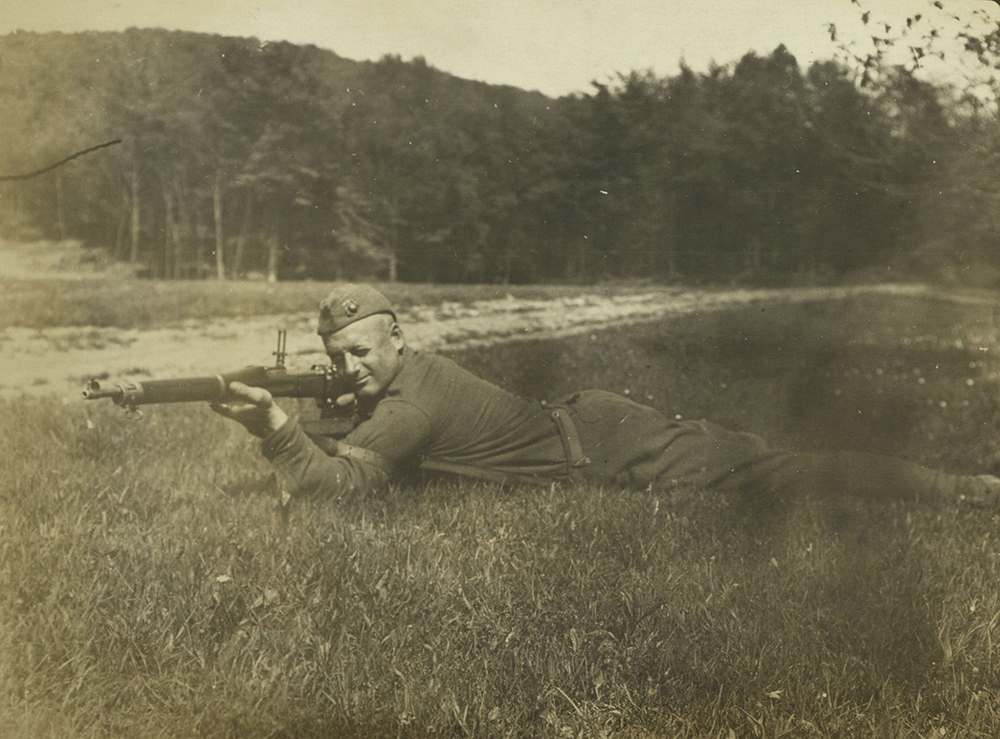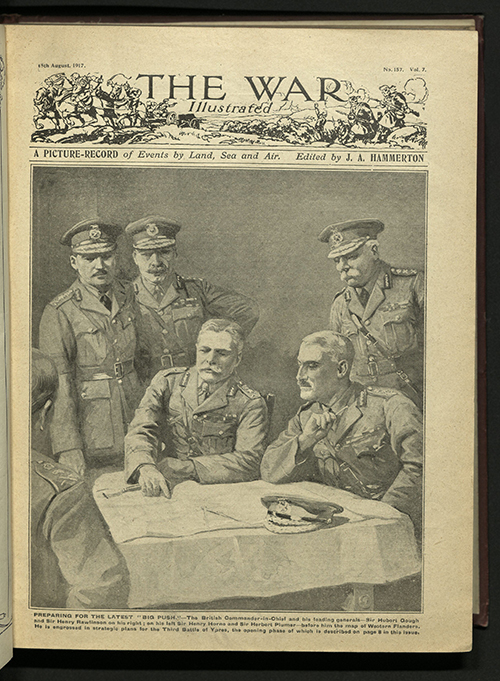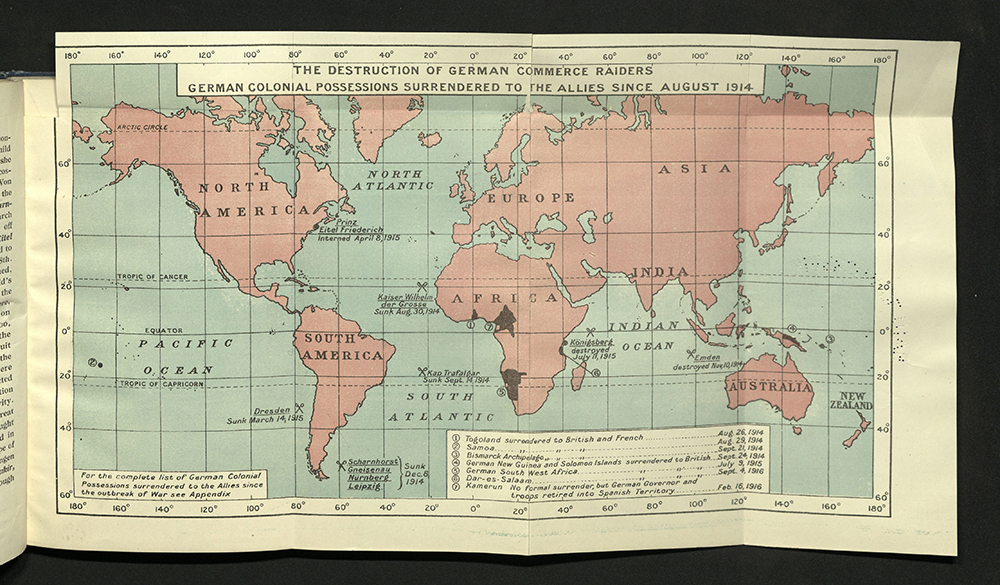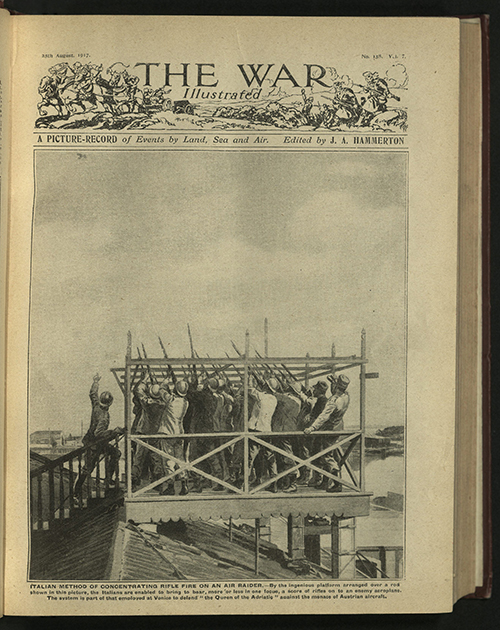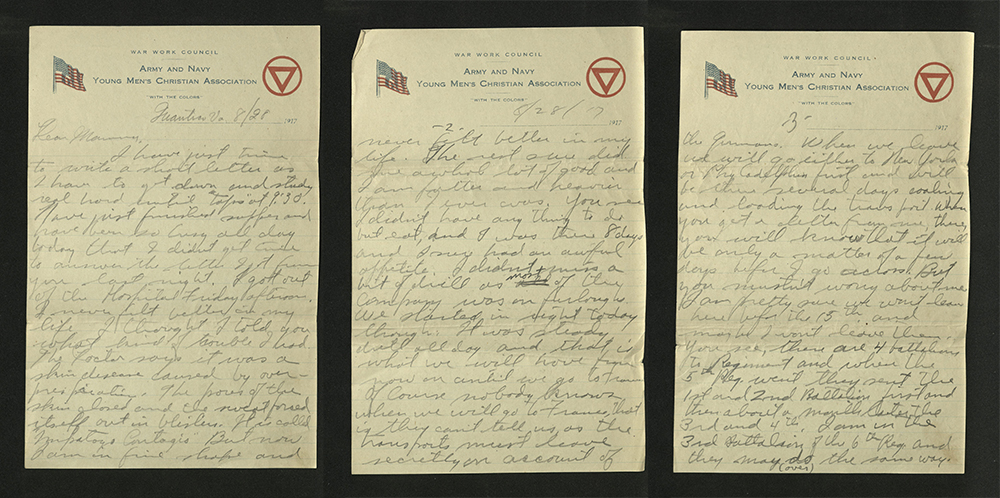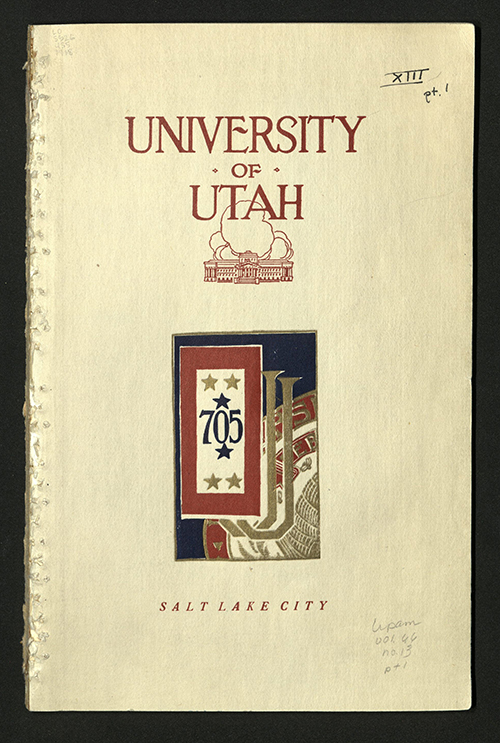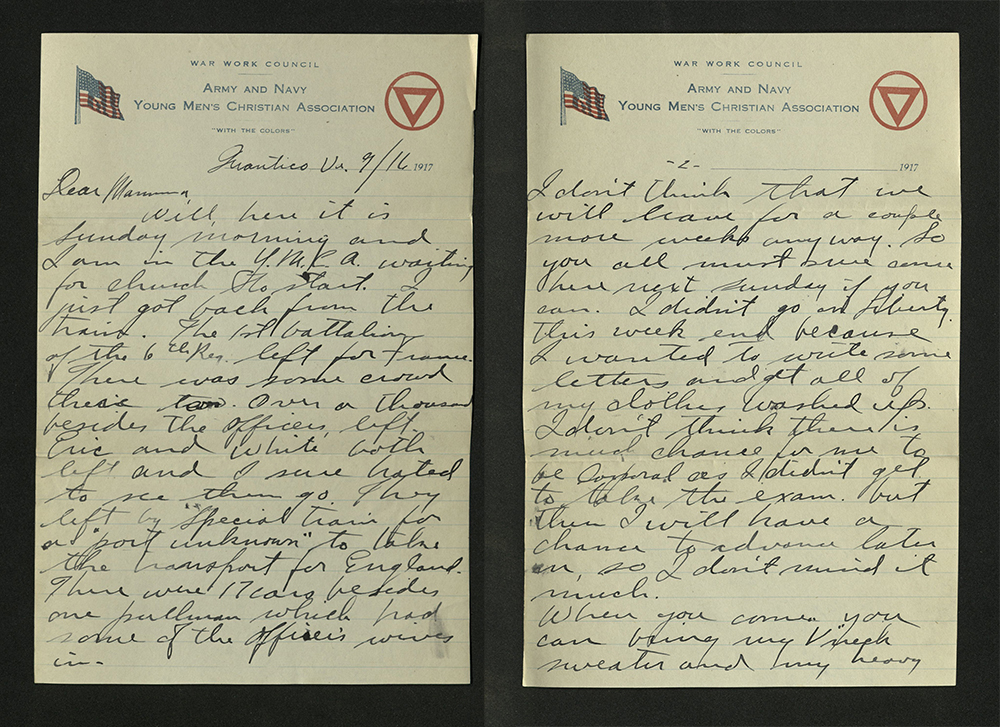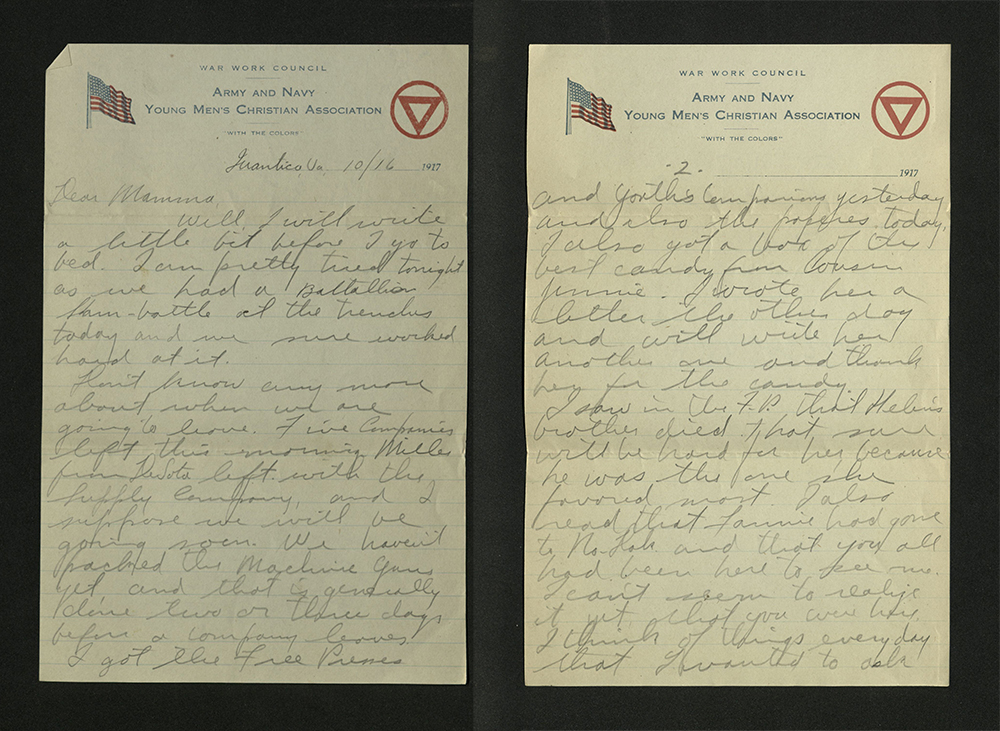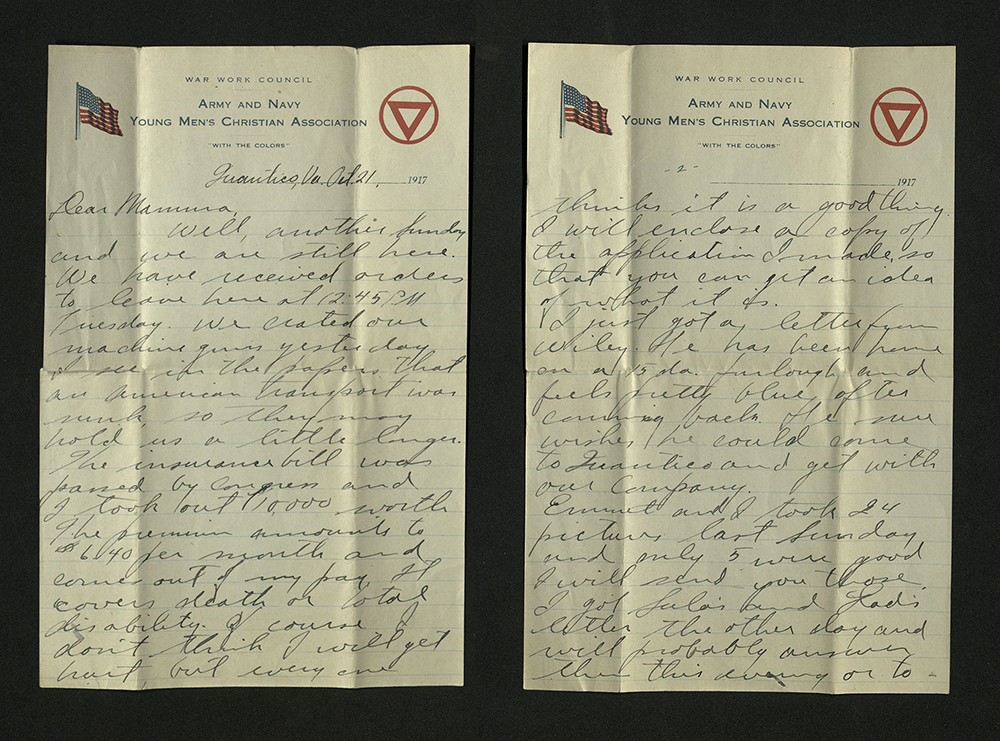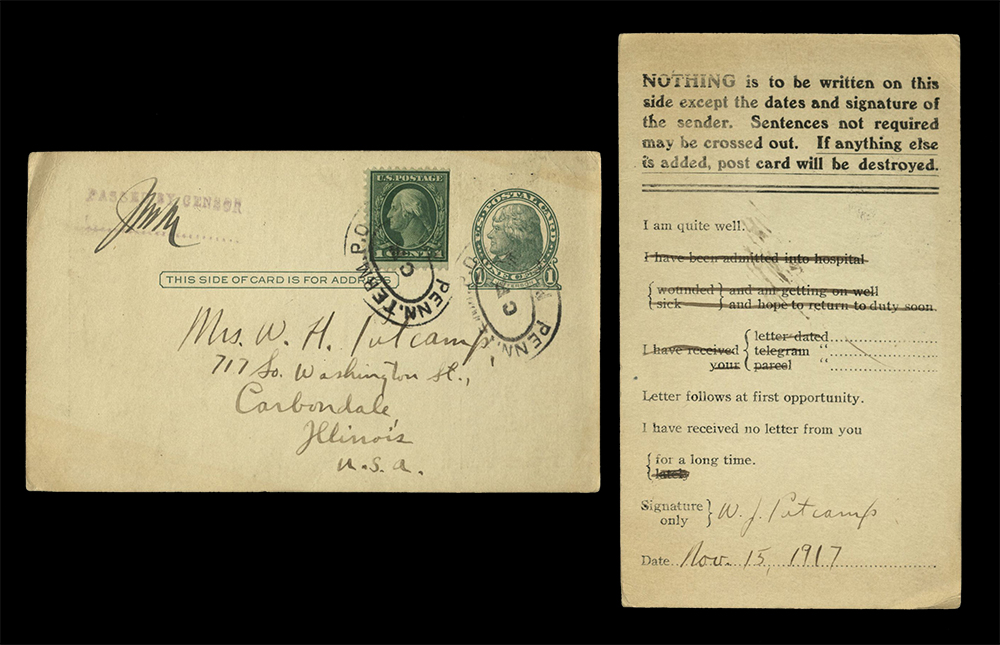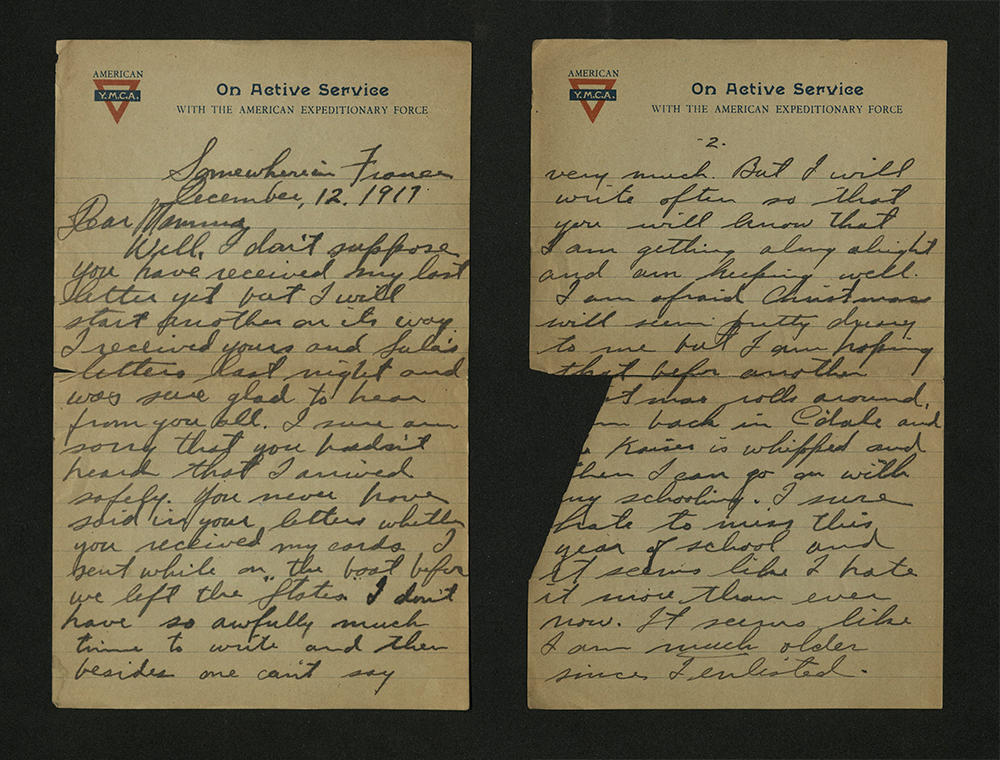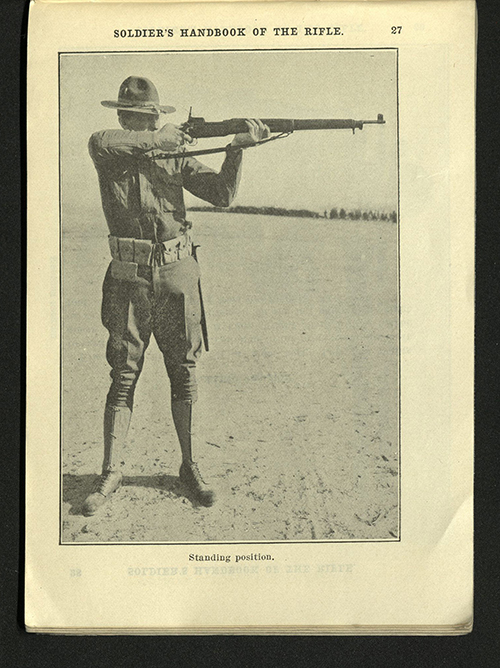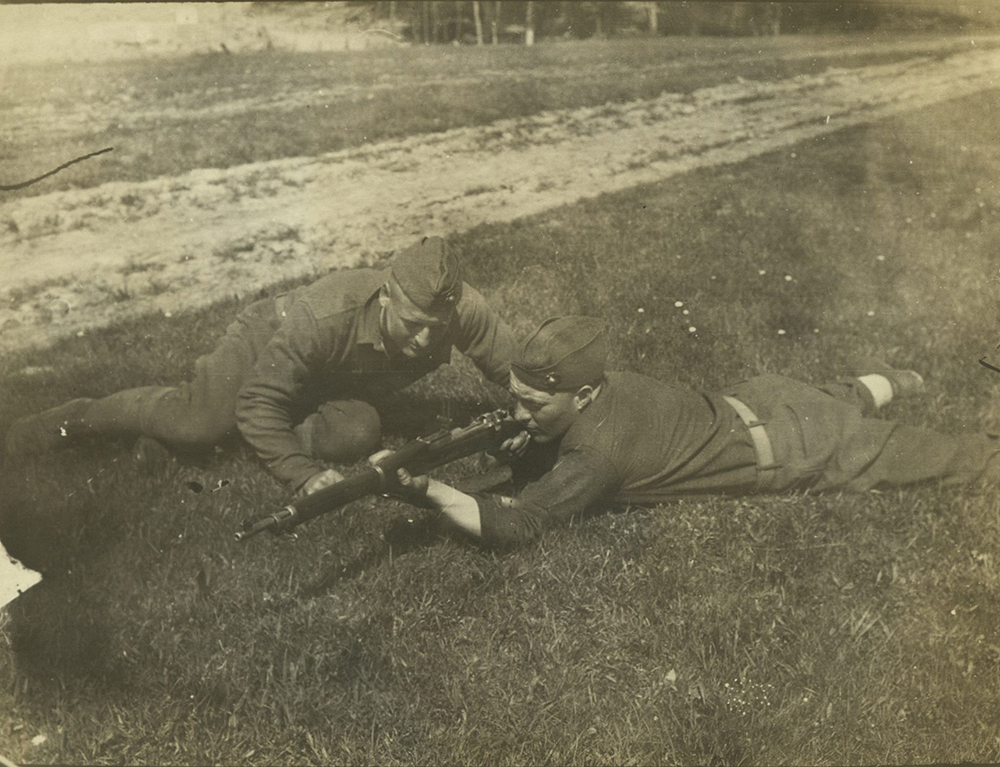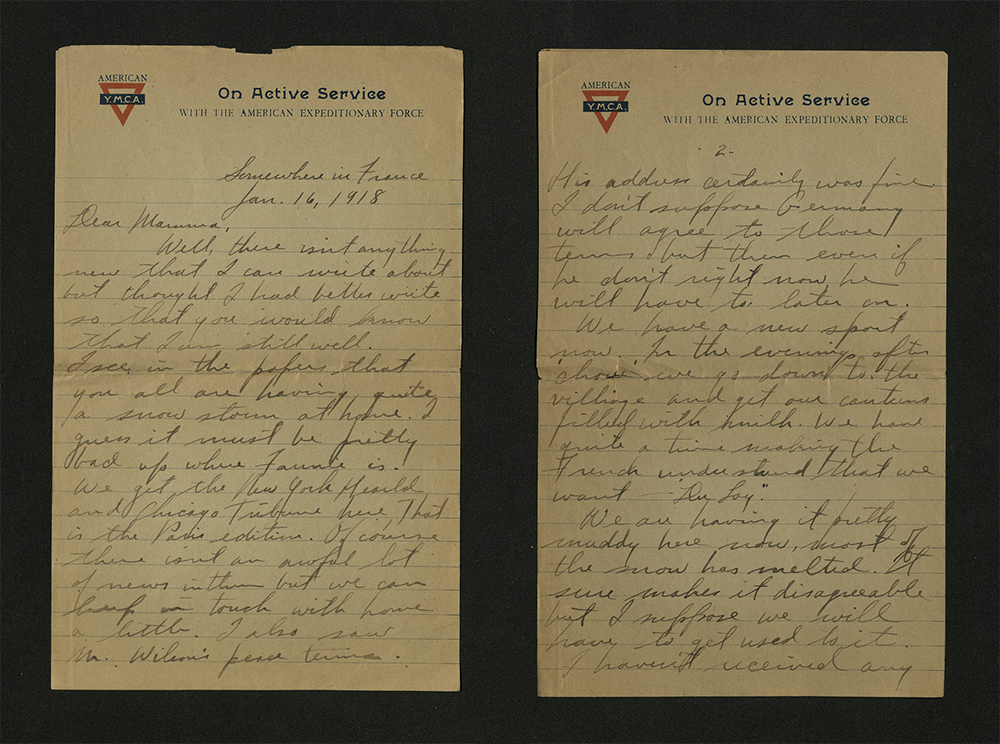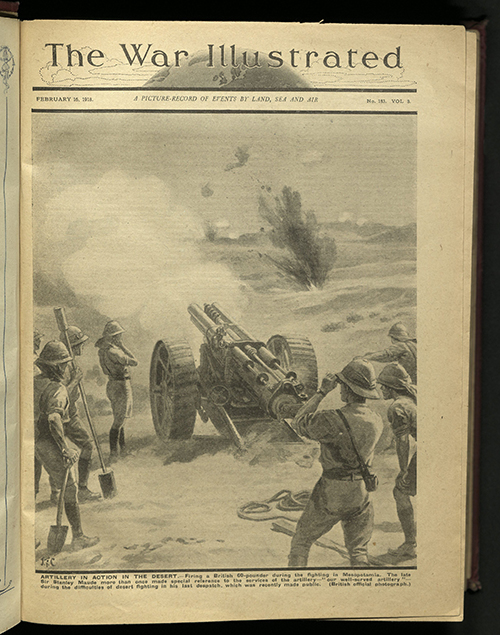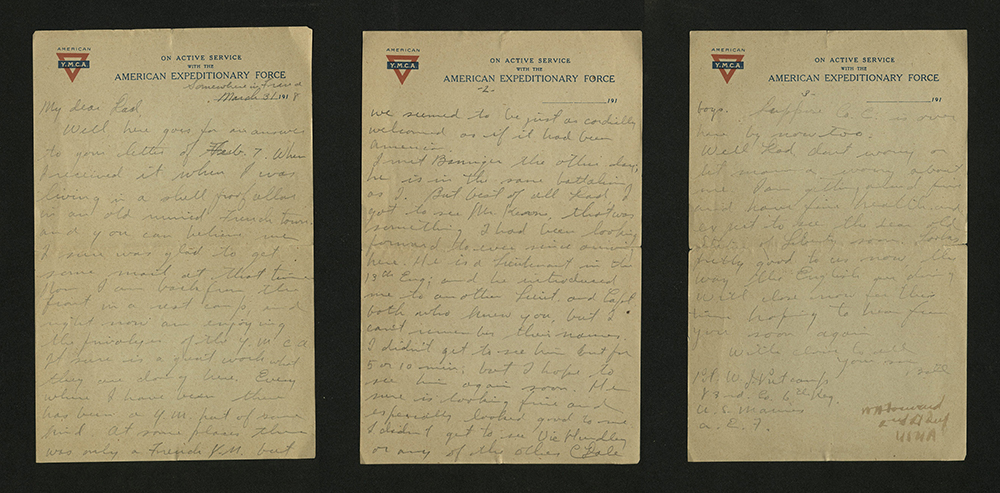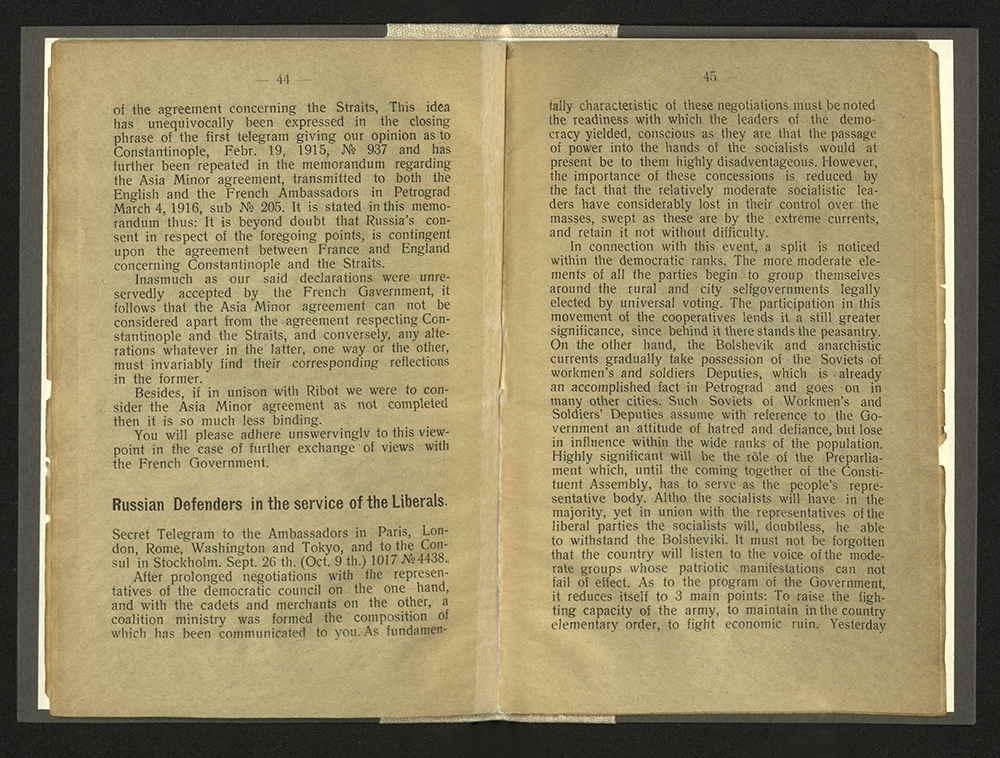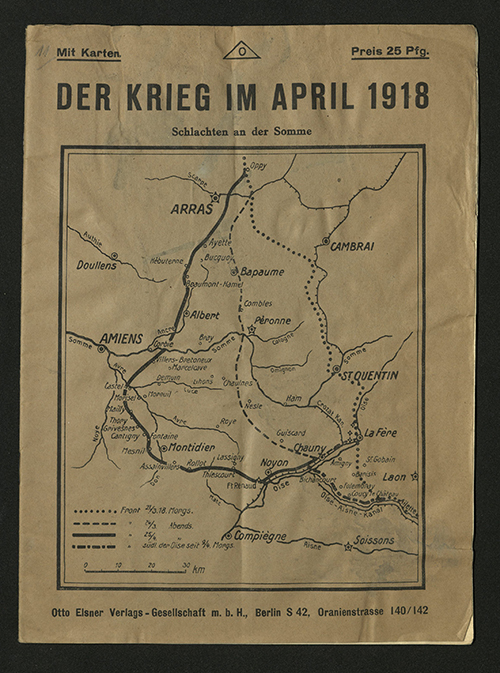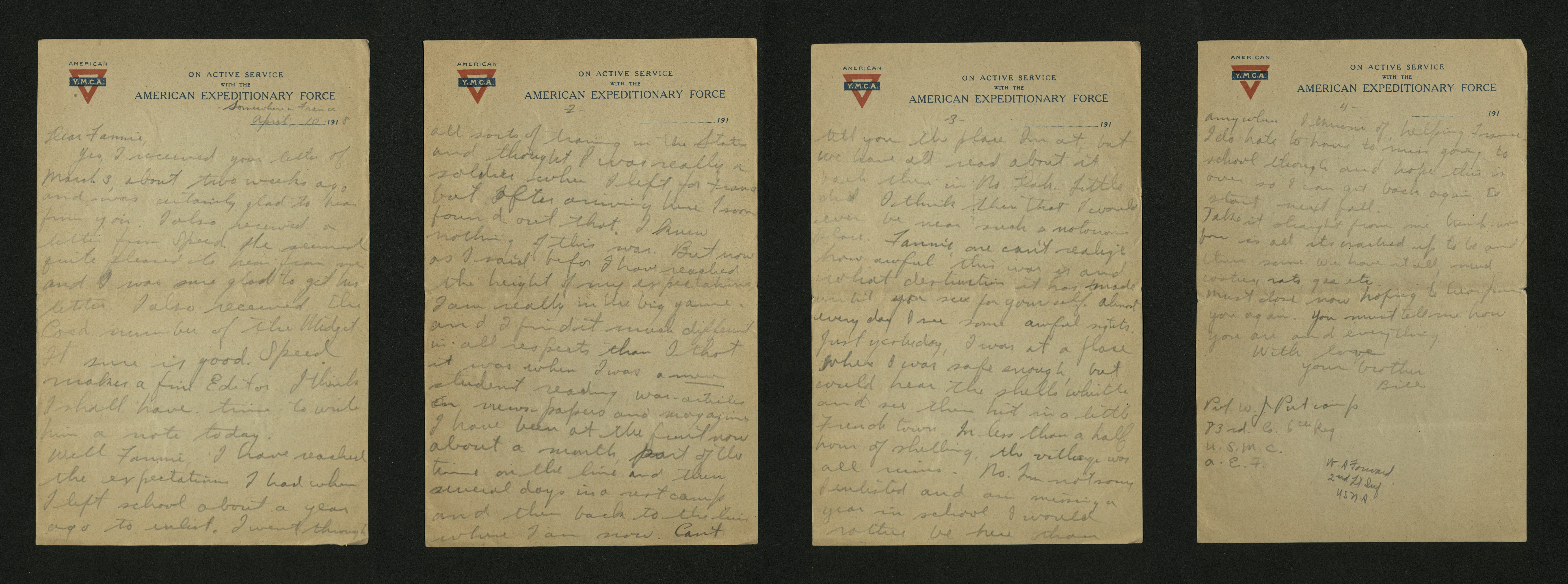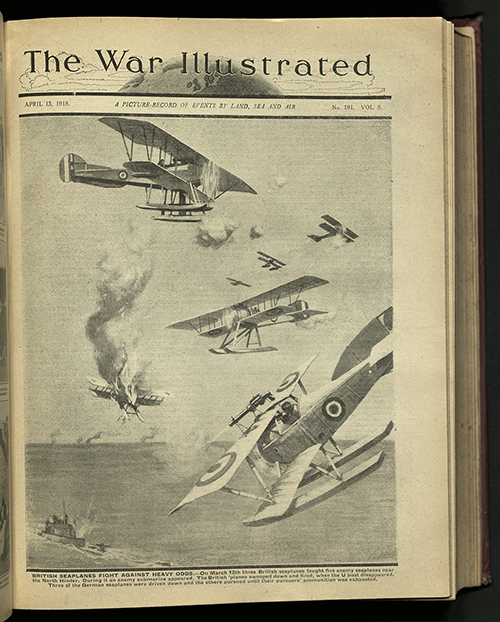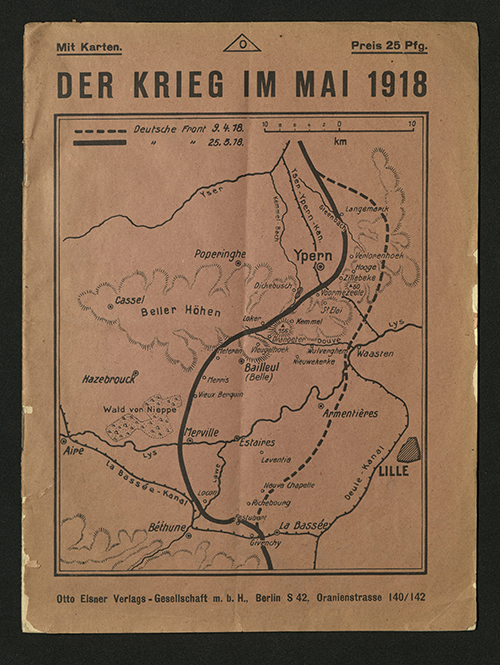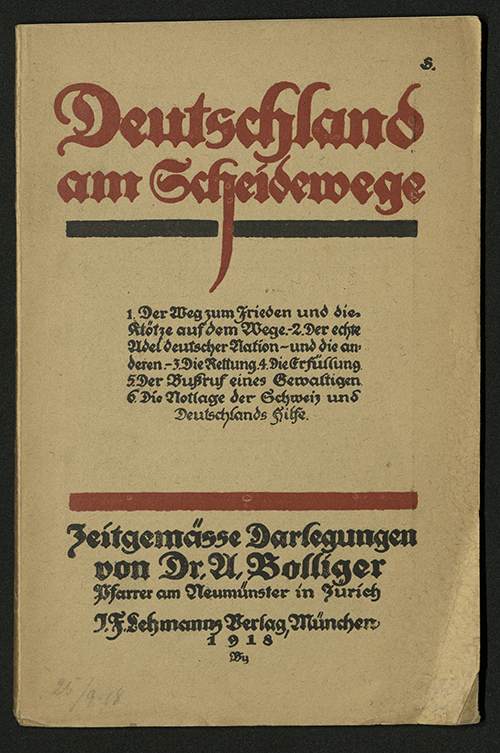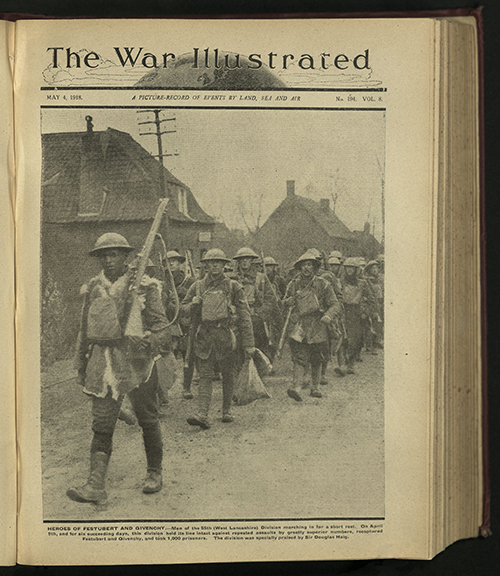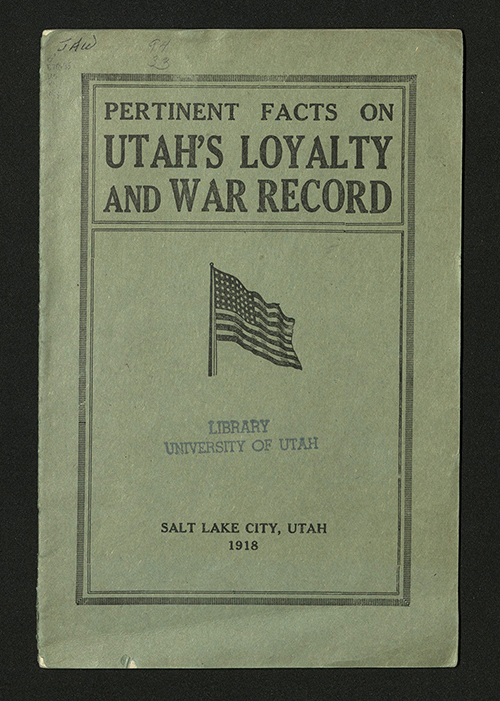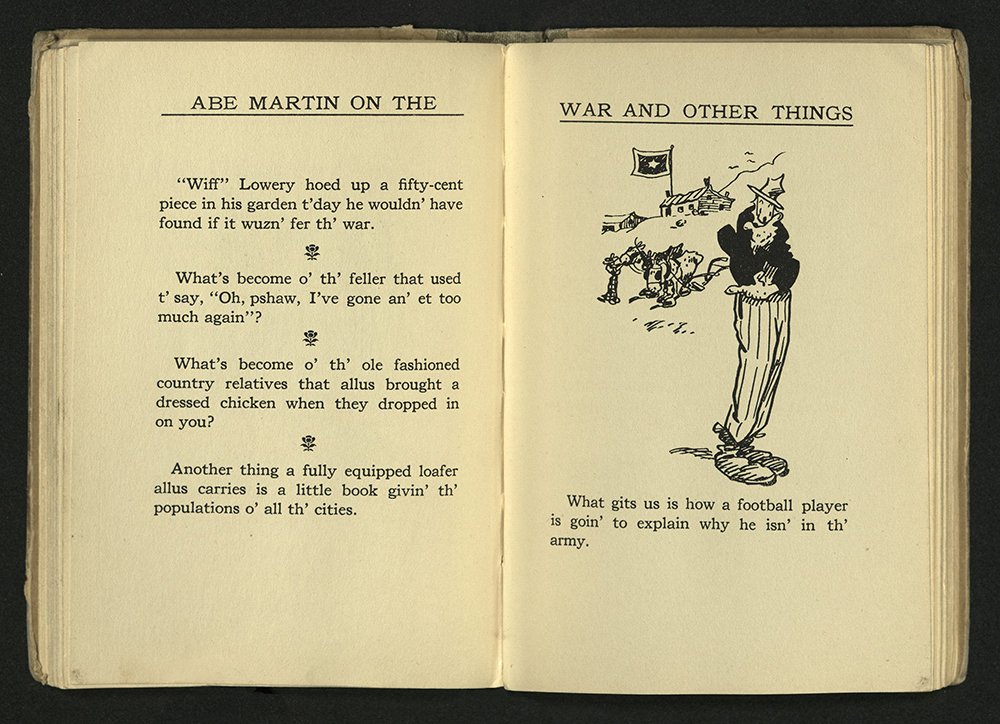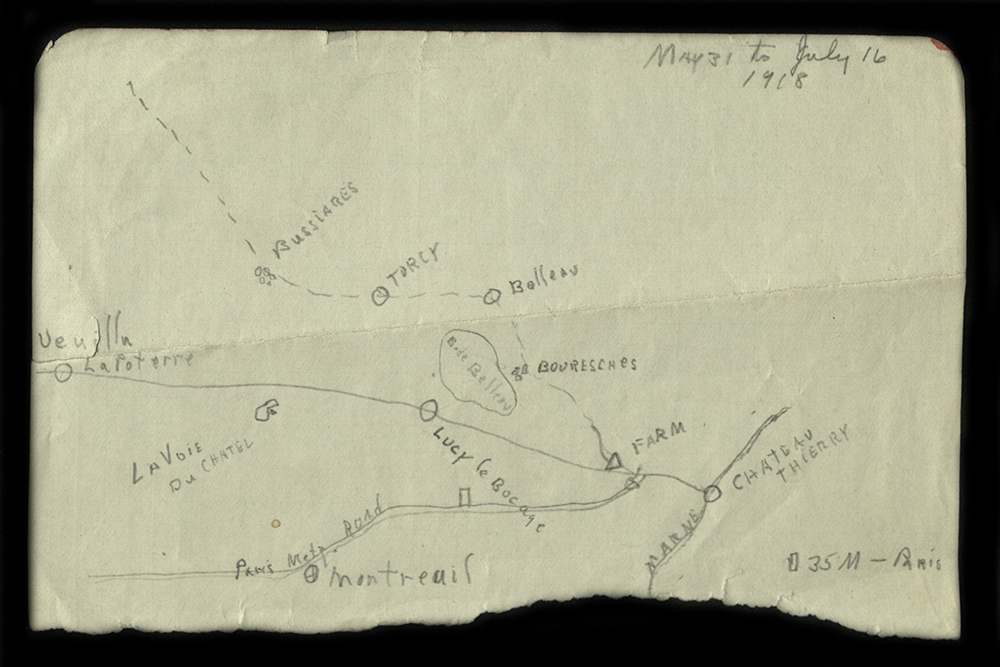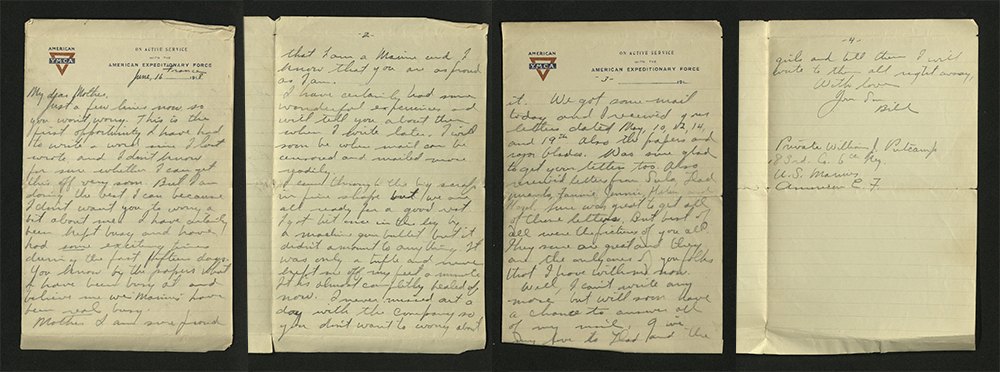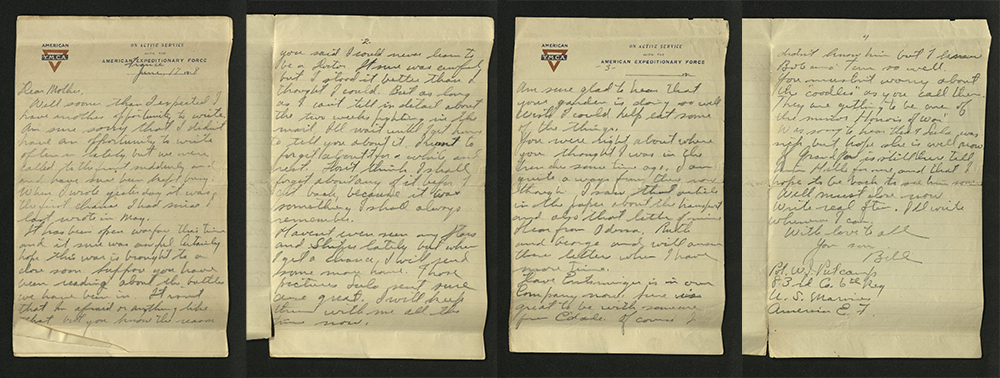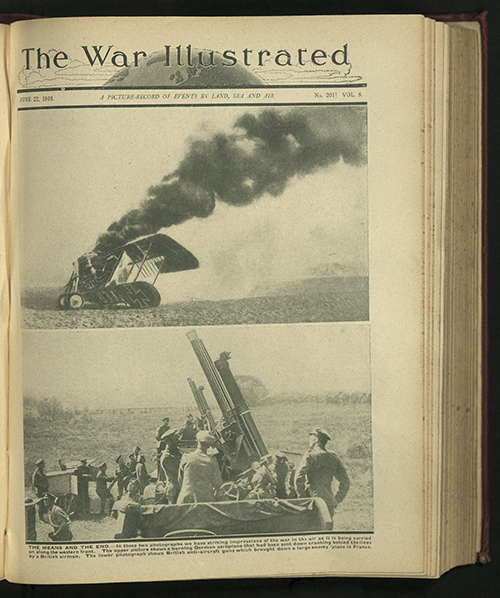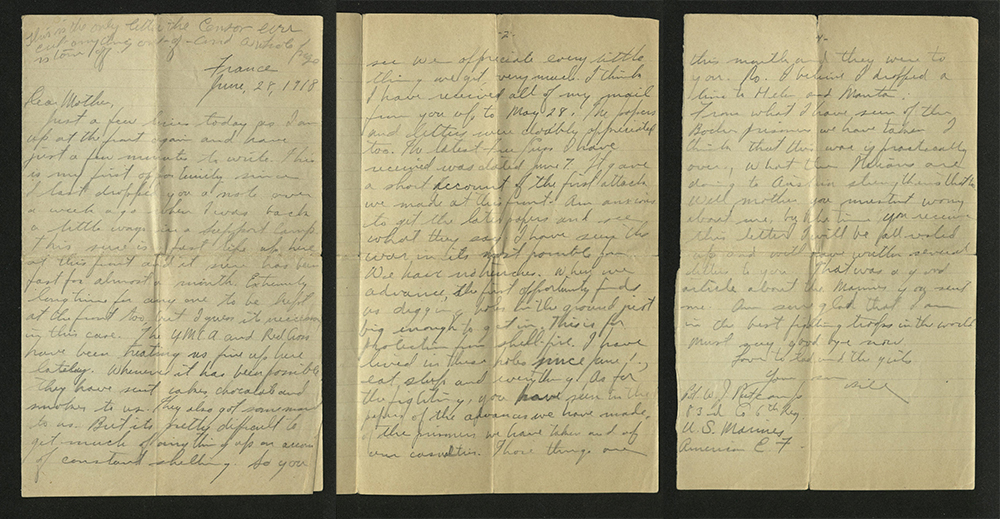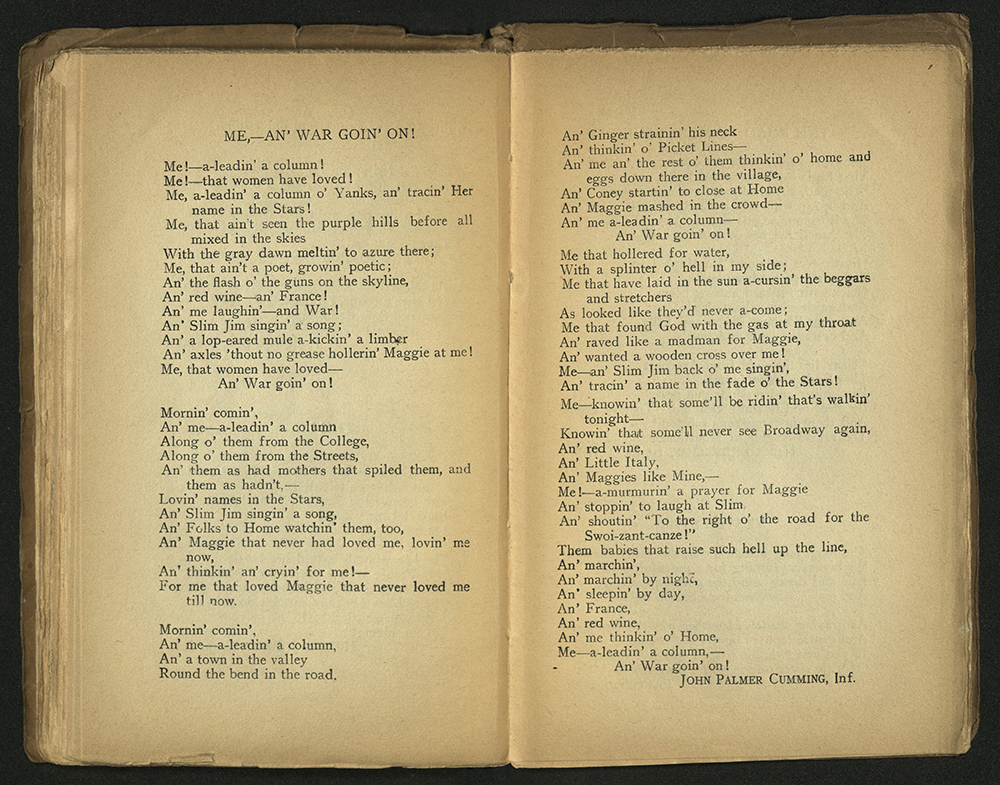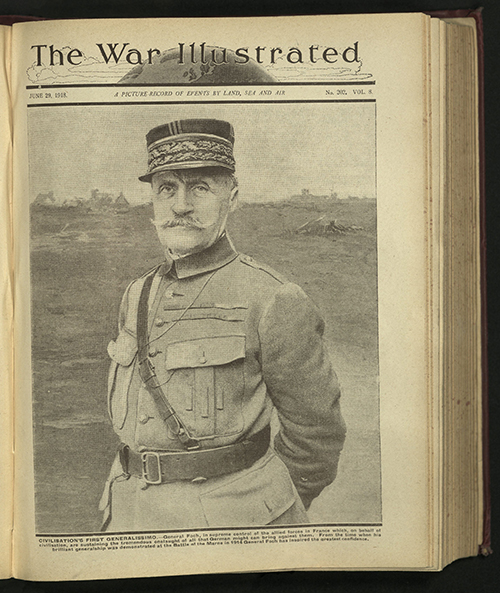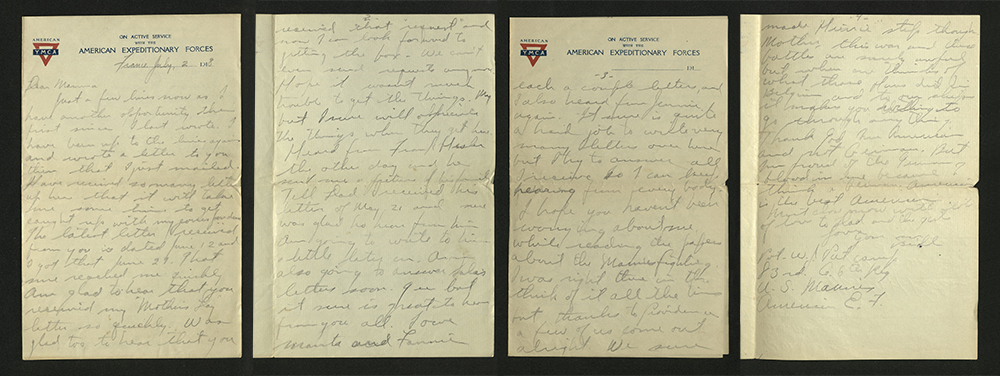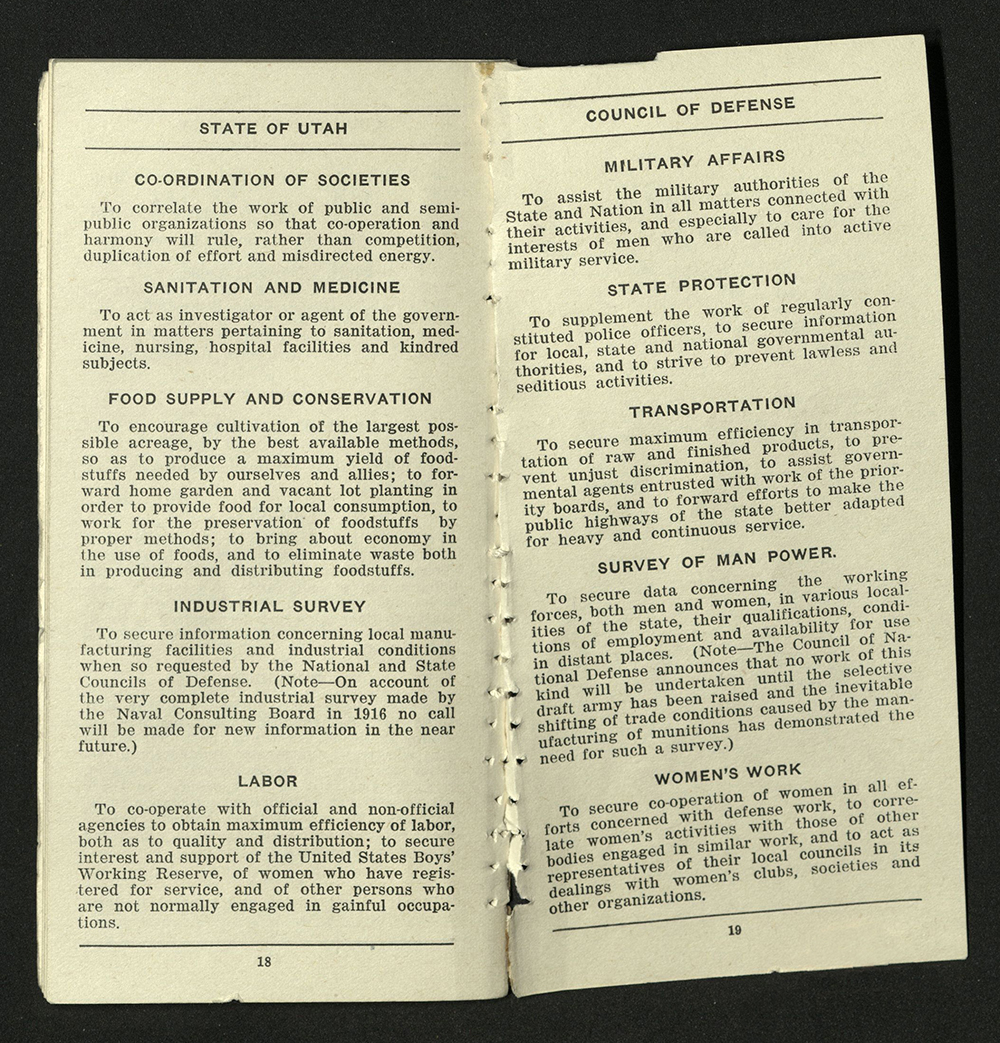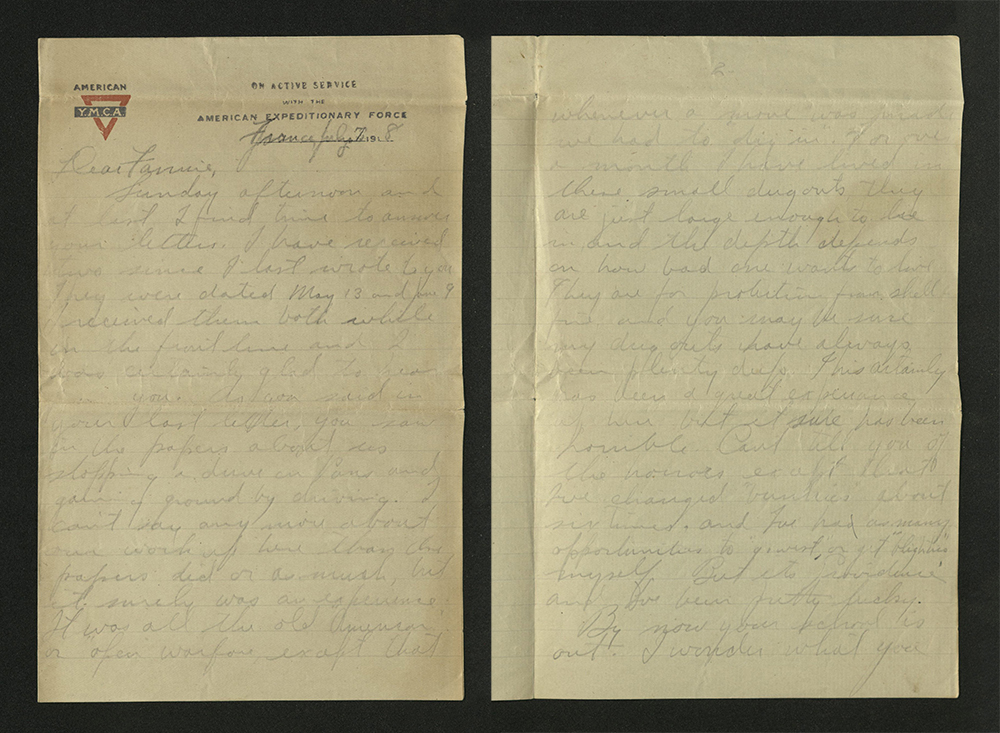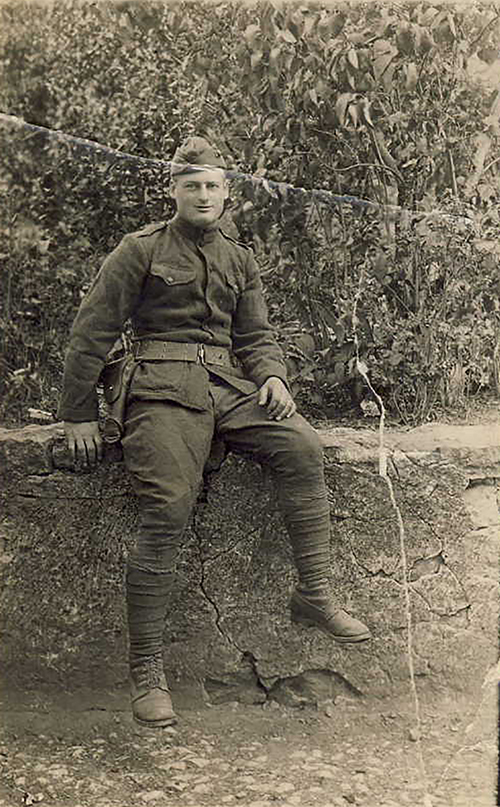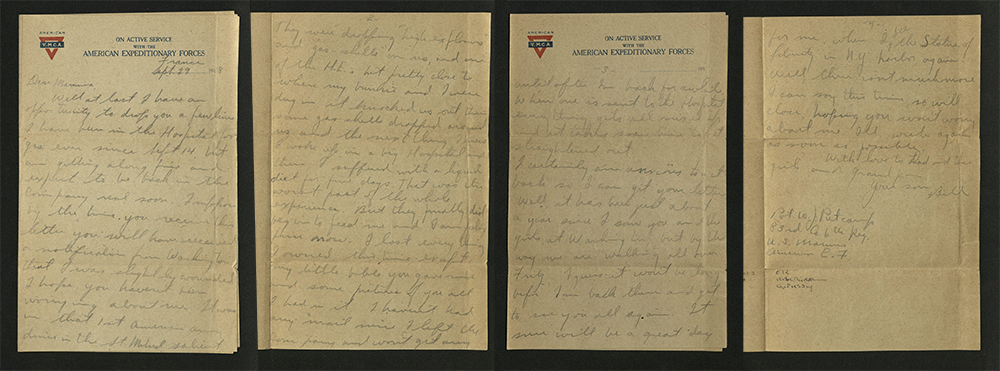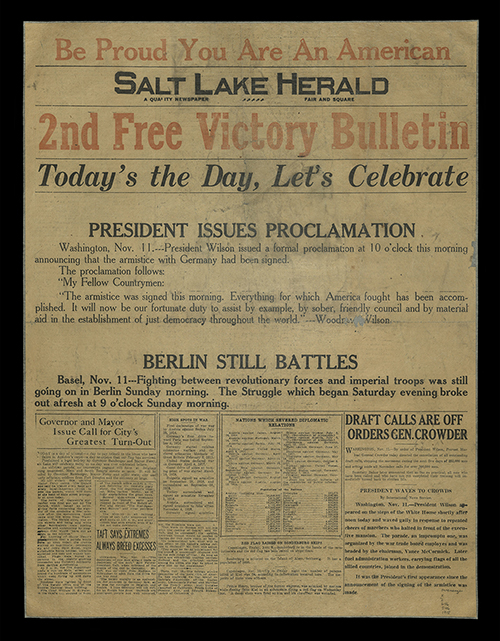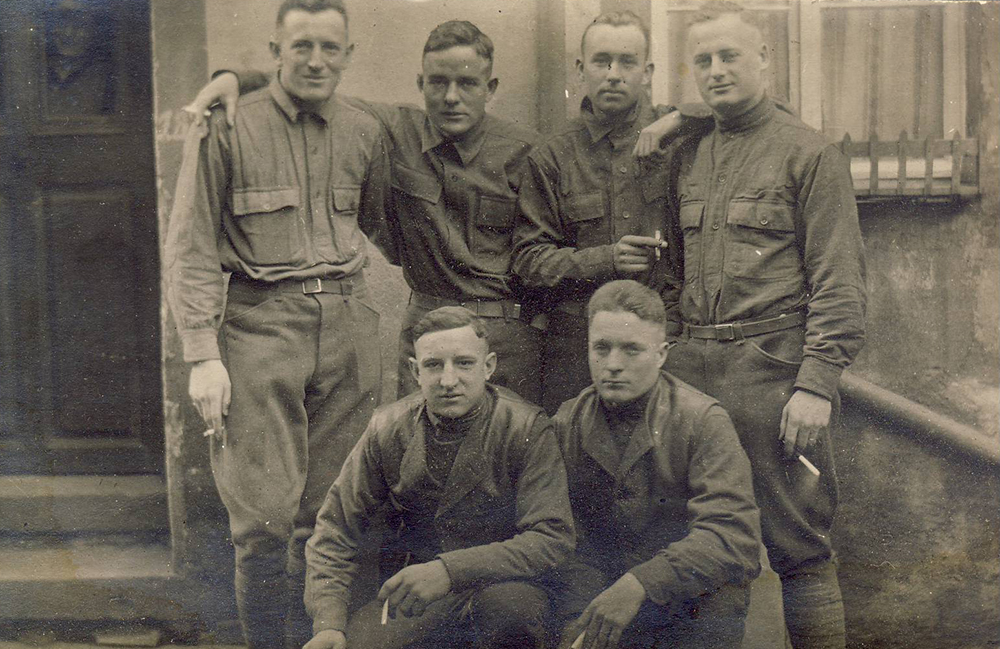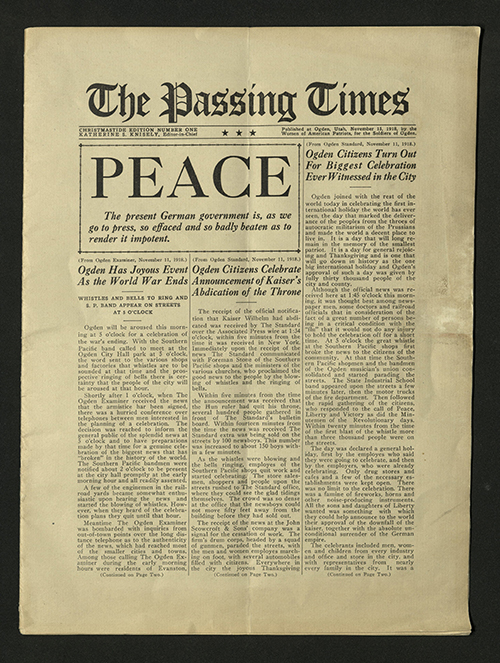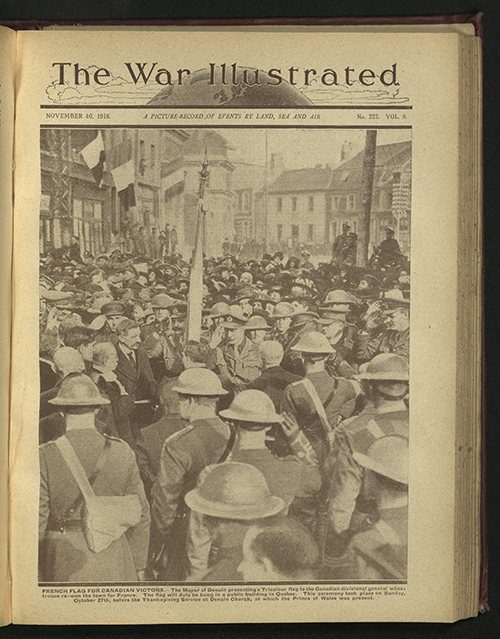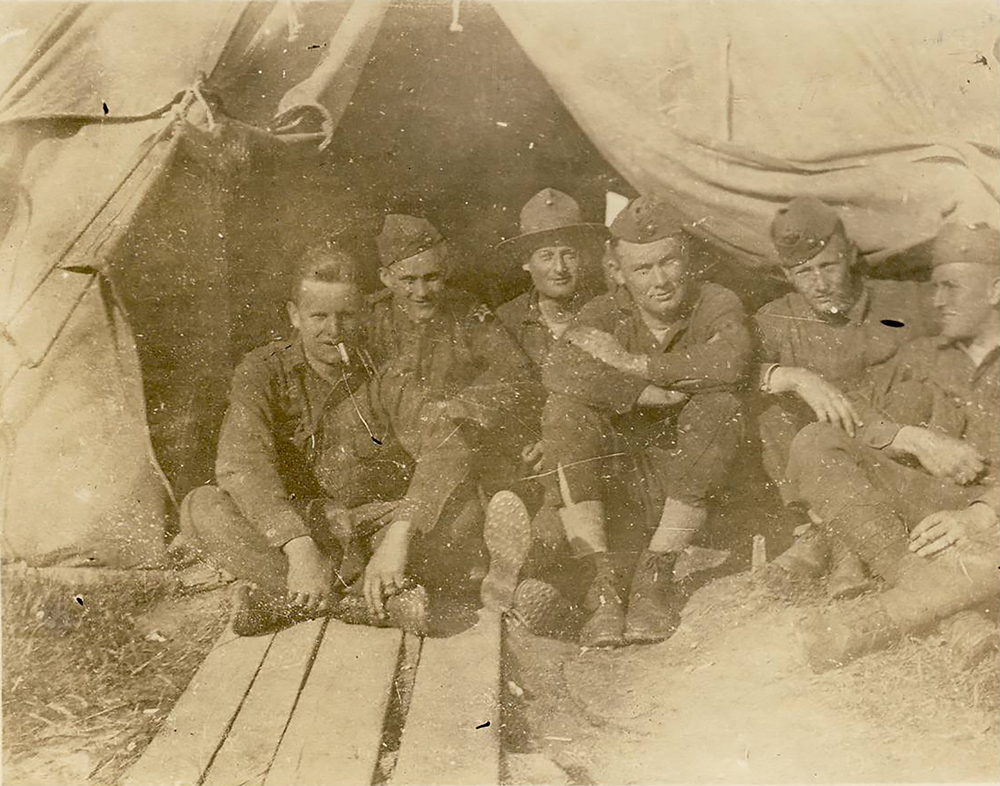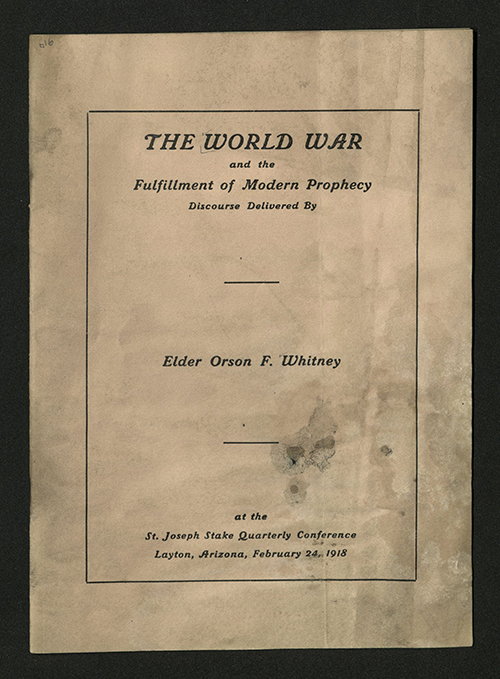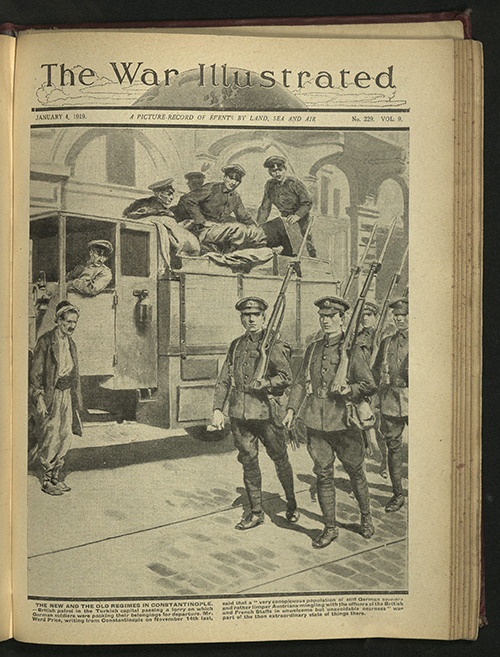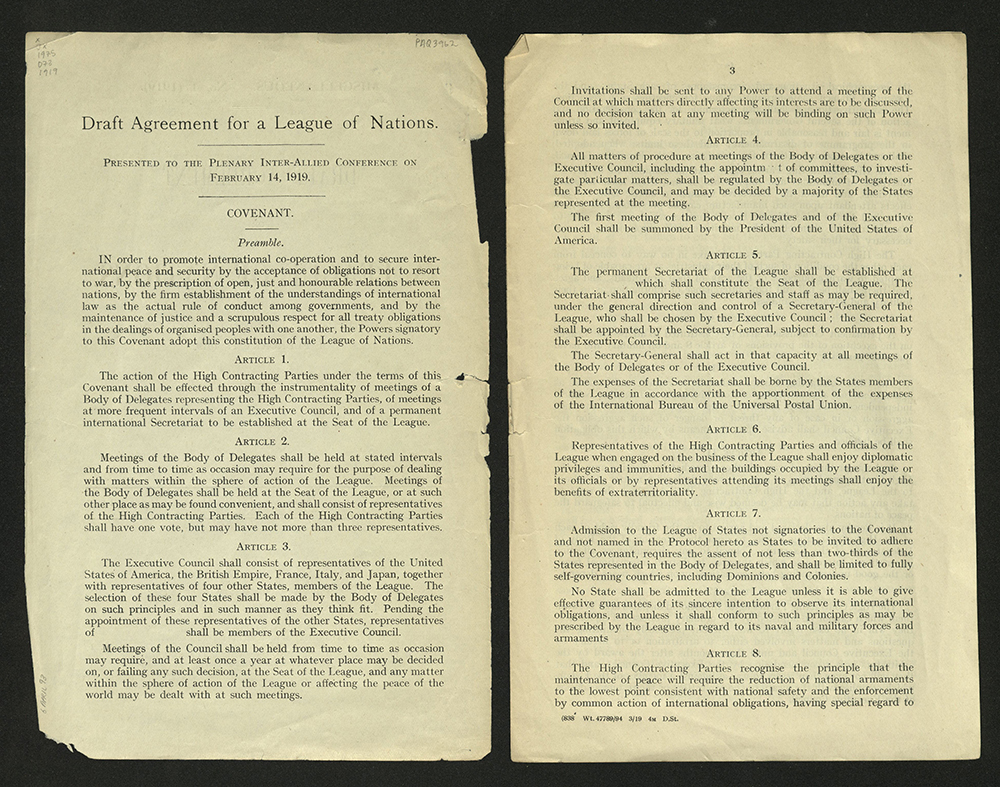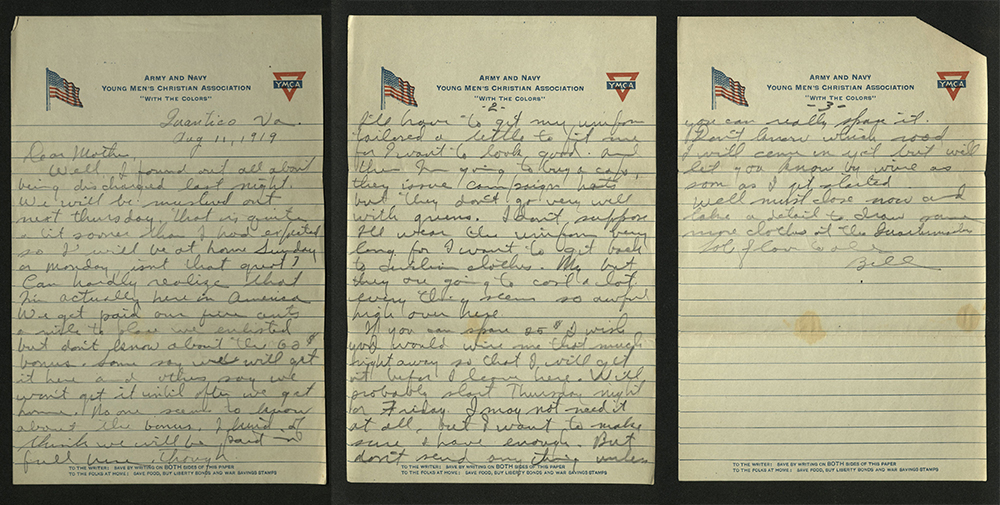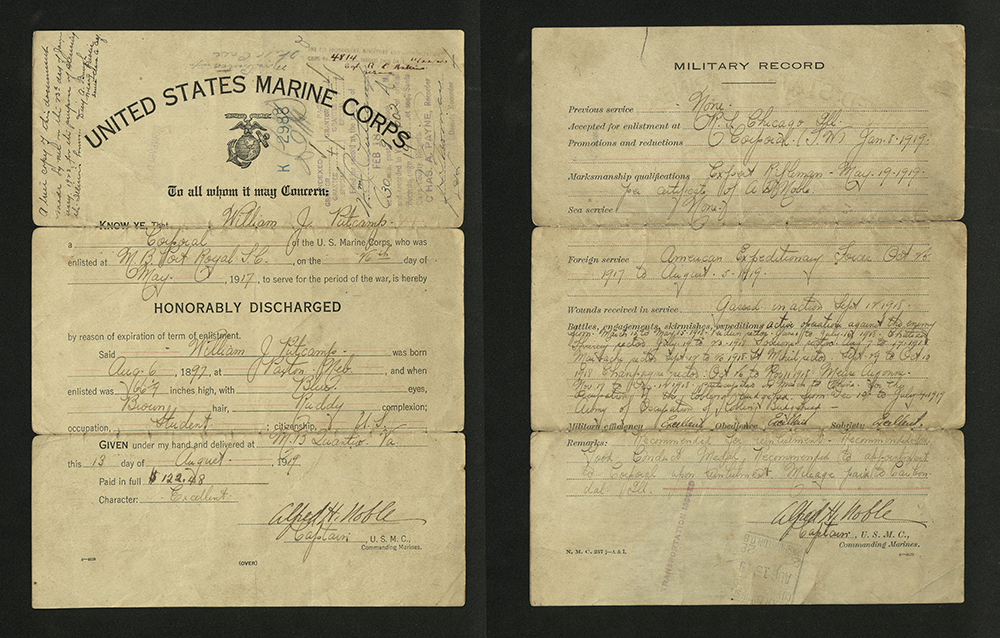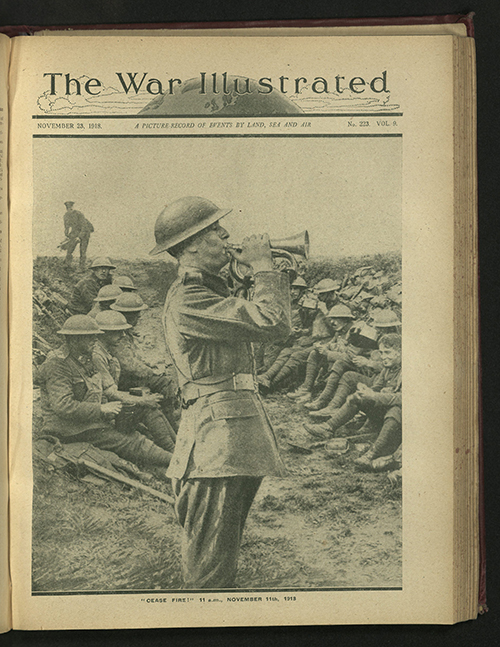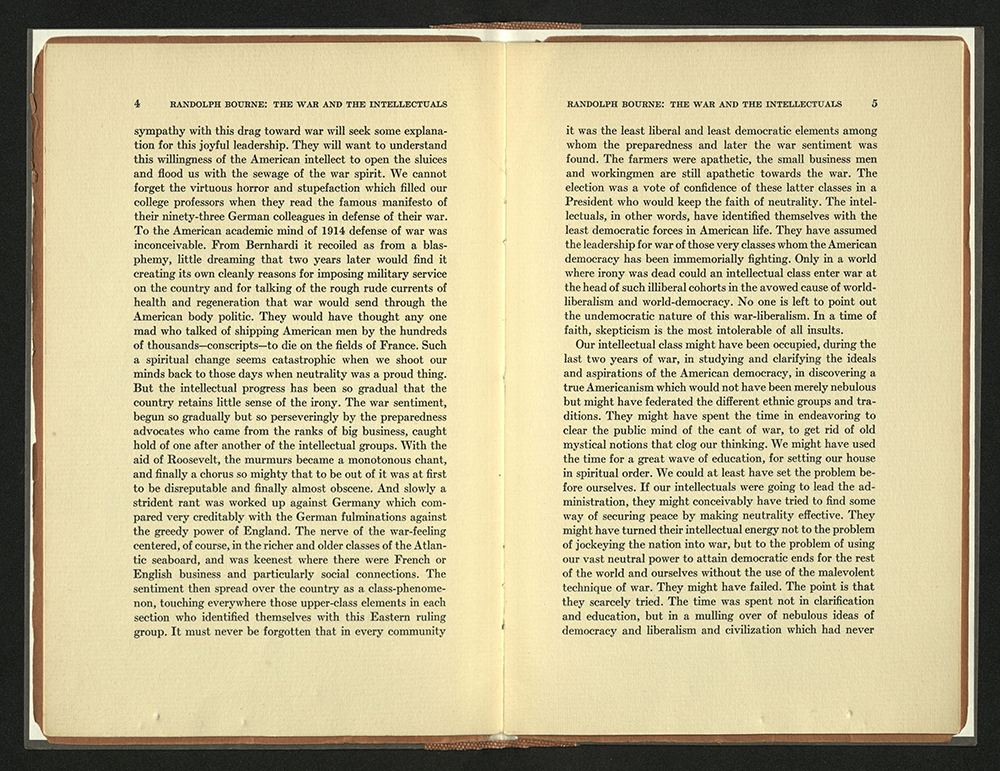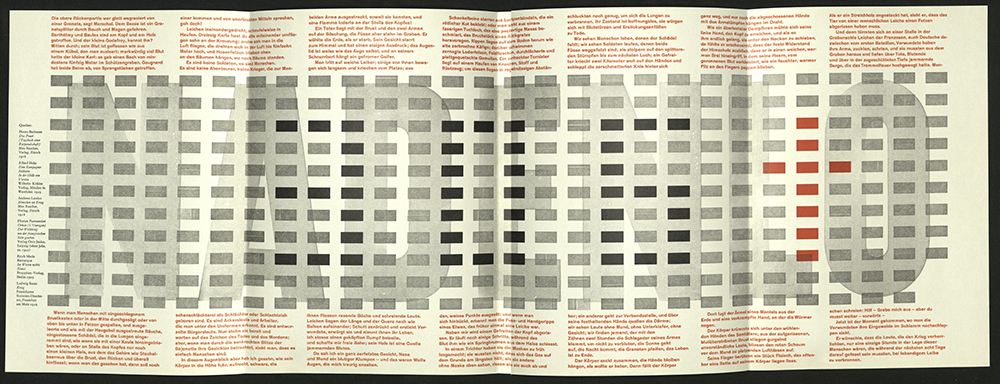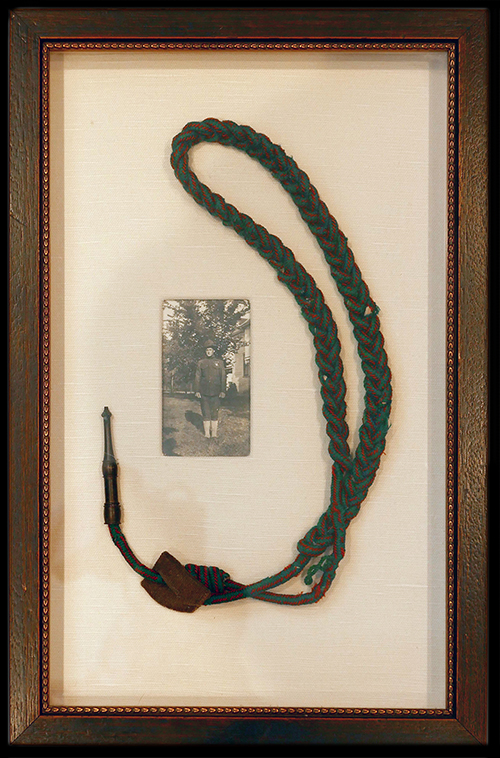The Great War: Here and Over There
Checklist for "The Great War"
Curated by Luise Poulton, 2014
Exhibition poster designed by David Wolske, 2014
Digital exhibition produced by Jon Bingham, with assistance from Scott Beadles, 2018
JX1932 1909
Speakers at the May 1909 Chicago Second National Peace Congress included Jane Addams, Samuel Gompers, and Count von Bernstorff. The Congress brought together five hundred and sixty delegates from thirty-two mostly mid-western and southern states. Invitations were sent to peace societies, philanthropic associations, educational institutions, business organizations, and city and state governments. The response from mayors and governors was nearly one hundred percent. But the overwhelming voice of influence came from college professors who helped students of international law make the program comprehensive and informative. A meeting for teachers introduced two organizations for the principles of peace – the American School Peace League and the Young Peoples International Federation League. Another meeting introduced the same theme for religious sermons in churches and synagogues. Some disruption occurred when the editor of Chicago's Socialist newspaper asked for formal recognition of socialism as the "greatest peace force in the world." After what was reported by the New York Times as "great confusion," the appeal was rejected. The adopted platform resolutions began, "Resolved, That public war is now out of date, a relic of barbarism unworthy of our time, and that the nations of the world, by joint agreement, by a league of peace among themselves, ought to make its recurrence hereafter impossible..." Five years after the Congress was held, the entire world was engulfed in a war that would affect the rest of the twentieth century.
D615 K5 1914
"It has been the privilege of little nations at different periods in the history of the world to render some signal service to civilization. That duty Belgium has now been called upon to render to European civilization, and nobly has she answered the call." – David Lloyd George
On August 2, 1914, the German government demanded that German armies be given unfettered passage through neutral Belgium in order to reach Paris. The Belgian government refused Germany's demand. On August 4, Germany invaded Belgium. At the request of Great Britain, the tiny Belgium army fought the much larger German army. Germany's act of hostility gave England reason to declare war against Germany because of an 1839 agreement to protect Belgium. Belgium's extraordinary efforts gave French and British forces time to prepare for the Marne counteroffensive a month later. German troops met Belgium resistance with death and destruction, shooting offenders and burning buildings. Germany occupied most of the country for the rest of the war. Belgium's King Albert, leading his army to a tiny strip of trenches behind the River Yser, stayed with his troops for the next four years.
This book was produced and sold by the Daily Telegraph for its Belgian Fund. Compiled by popular novelist Hall Caine, it contains contributions of letters of support, short stories, poetry, drawings, paintings and music by Gilbert Chesterton, Winston Churchill, Claude Debussy, Edmond Dulac, Kay Nielsen, Maxfield Parrish, Arthur Rackham, Thomas Hardy, Aga Khan and more than two hundred others. Several Americans were among the contributors, including Edith Wharton and Ella Wheeler Wilcox. About 250,000 copies were sent to American distributors in an attempt to persuade neutral United States to join the fray. Illustrated with color process plates, relief halftones and line photo-engravings.
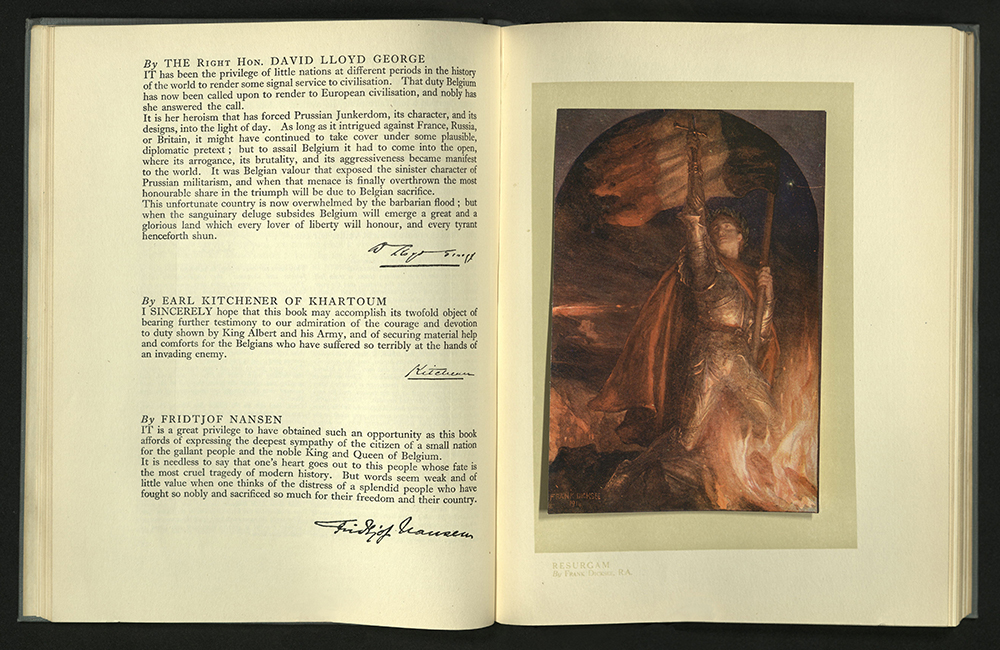
AY14 P8 1914
"All profits from sale are given to the Queen's Work for Women Fund which is acting in conjunction with the National Relief Fund."
The Queen's Work for Women Fund helped care for the flood of refugees coming into England from Europe and enabled women to find paid employment. Princess Mary was the only daughter of King George V and Queen Mary. Her gift book was published two years in a row, beginning in 1914 when Princess Mary was 17. The book contains short stories and poems from well-known authors, including J. M. Barrie, Arthur Conan Doyle, and Rudyard Kipling. Illustrated with black and white drawings and tipped-in plates by Edward Dulac, Arthur Rackham, and others. This was the first of a group of books sponsored by prominent people, sold to raise money for the war effort. It was also the most popular. More than 600,000 copies were sold. The book later became notorious after it was discovered that two young girls (aided by a believing public) used images from the book to perpetrate a hoax about seeing fairies.
"Gift books" had been popular since the latter half of the 19th century, usually combining illustrated plates with literary miscellanies from popular authors. Often used as fund raisers and to promote causes, many were produced just before and during the American Civil War, supporting the abolition of slavery.
University of Utah copy gift of Michael Homer.
D522 W37
"The cause of a war and the object of a war are not necessarily the same. The cause of this war is the invasion of Luxemburg and Belgium. We declared war because we were pledged to protect the integrity of Belgium since the kingdom of Belgium has existed. If the Germans had not broken the guarantees they shared with us to respect the neutrality of these little States we should certainly not be at war at the present time. The fortified eastern frontier of France could have been held against any attack without any help from us. We had no obligations and no interests there. We were pledged to France simply to protect her from a naval attack by sea, but the Germans had already given us an undertaking not to make such an attack. It was our Belgium treaty and the sudden outrage on Luxemburg that precipitated us into this conflict. No power in the world would have respected our Flag or accepted our national word again if we had not fought." – H. G. Wells, "Why Britain Went to War: A Clear Exposition of What We are Fighting For, expressly written for The War Illustrated."
Published by William Berry and later by Viscount Camrose, owner of The Daily Telegraph, the first issue of this magazine was released on August 22, 1914, eighteen days after England declared war on Germany. The content and editorial style was deliberately sensational and patriotic, justifying Britain's entry into the European conflict and encouraging men to enlist. It contained mostly photographs and illustrations, along with short articles. Many of the illustrations were dramatizations, if not fabrications, of events. Many of the early reports of German atrocities were sheer invention. By 1916, and the purchase of the magazine by The Daily Telegraph, a greater attempt was made at verifying its content. By the end of World War I, circulation had reached a peak at 750,000 subscriptions. Its primary audience was working-class. Original issues bound and sold as a set by Amalgamated Press.
D515 W355 1914
"...our cause is just. Just as Luther once wrote...so can we also say, "Now our conscience in this case is innocent, pure and safe. Let our happy people go out and onto the worst...impose God's wrath..." Wilhelm Walther, professor of theology and rector at the University of Rostock wrote this tract ("German's Sword Consecrated by Luther") blessing German aggression on the basis of the state's moral authority. Walther taught at Rostock until 1920.
D522 W37
"This is no time to say 'I told you so' to those who were incredulous as to the coming of Armageddon which we now face in Europe, or to those who declared that if Armageddon did come, the Overseas Dominions would break away, selfishly fearing their fate, and establish independent nationalities. Armageddon has come! The heart of Europe is laid bare, and we can see its fierce pulsations and know whereof it is made; but also the hearts of the Overseas Dominions have been laid bare, and we know, without peradventure, that they throb in unison and in purpose with Great Britain and also Ireland, thank God!" – Sir Gilbert Parker, M.P. in "The Rally of the Empire: How the Oversees Dominions Are Standing By the Motherland"
JX1932 A5 1915
The American Peace Society was the first nationally based secular peace organization in the United States. It was formed in 1828 with a merger of peace societies from Maine, New Hampshire, Massachusetts, and New York and Philadelphia. Regional peace societies had developed in the United States since 1815. Not all of the peace societies joined in this merger. The affiliations were overseen with varying control from a national office. The political philosophy of the Society was never particularly radical or pacifist. Several groups broke away to form new organizations such as the New England Non-Resistance Society in the 1830s and the Universal Peace Union in 1866. The stated purpose of the American Peace Society was to "promote permanent international peace through justice; and to advance in every proper way the general use of conciliation, arbitration, judicial methods, and other peaceful means of avoiding and adjusting differences among nations, to the end that right shall rule might in a law-governed world." The APS was instrumental in bringing many peace congresses to The Hague, beginning in 1843; the Pan American Congress (out of which grew the Pan American Union); and to the United States from 1907 to 1915. A coalition with other peace societies was shattered by World War I (which the APS endorsed), and by the postwar debate over the League of Nations.
D525 C5 1915
Houston Stewart Chamberlain was born in England to English parents. He was educated for the most part in France by a German tutor. He is best known for Die Grundlagen des neunzehnten Jahrhunderts (The Foundations of the Nineteenth Century), 1899, a work favorably reviewed by George Bernard Shaw and Theodore Roosevelt. Chamberlain argued that Western civilization's moral, cultural, scientific, and technological superiority came from the positive influence of the Germanic race. Wilhelm II invited Chamberlain to his palace, writing, "It was God who sent the German people your book and you personally to me." Chamberlain published several war propaganda pieces against England. In Kriegsaufsätze (Wartime Essays), Chamberlain wrote of Germany as a nation of peace and German as the world's greatest language. He wrote that the world would be better off doing away with English and French-style parliamentary governments in favor of German rule, "thought out by a few and carried out with iron consequence." Several times within these essays, Chamberlain predicted the rise of a strong future leader for the Germans, "the man with the lion's heart" and "The Germans are ready for it: all that is missing is a God-sent Führer." The popularity of his work is borne out by the fact that this is the tenth edition printed in one year. The war essays sold hundreds of thousands of copies. The earnings went to the Red Cross. Chamberlain received the Iron Cross for services to the German empire. In 1916, he became a German citizen.
D522 W37
"So far as superficialities go there is no answer to this question but Yes. There will be the widest modification of fashions and appearance all over the world as the outcome of this world convulsion. There will be, moreover, at least a temporary and conceivably even a permanent impoverishment that will leave its mark upon the arts, upon the way of living, upon the social progress of several generations. All sorts of little things that were already on the wane will vanish for ever, and their disappearance will give a character to books and pictures and photographs. If presently one sees a picture with men in silk hats or British soldiers in busbies and redcoats or servants in livery, or if one comes upon a spiked helmet, or a piece of Morris furniture, or a cricket-bat, or a coachman with a cockade, one will be reminded pleasantly of the good old times. And we shall develop a superstition that all men wore silk hats in town, or carried cricket-bats in the country before 1914. But these are the mere outward shows of life. What we would speculate upon now is the probability of deeper changes in the national attitude and the general way of taking life in Britain, and more especially England, which is – so to speak – the writer's field of observation." – H. G. Wells in "Will the War Change England?"
D626 G3 M3 1915a
A bookseller's sample, consisting of specimen pages, with publishing proposal and pages for recording subscriptions.
D515 M347 1915
"Bei dieser gewaltigsten, kriegerischen kraftanstrenung der deutschen Nation wird das Glück des Sieges uns nur dann auf die Dauer treubleiben, wenn wir tüchtig sind, wenn wir uns bestreben, die groβe uns gestellte Aufgabe der Weltgeschichte zu erkennen, und sie zu erfüllen."
"With this most powerful, martial struggle of the German nation the luck of victory will only remain and endure faithful to us if we are strong, if we exert ourselves, to recognize and fulfill the great task world history has set for us." – loose translation by Jon Bingham
D522 W37
"A year ago the peace of the world was shattered, and the blood-red streamers of war blazoned the skies. For a quarter of a century men had prophesied that the Balkans would cradle a struggle that would loosen the sabre in the scabbard in every capital in Europe, yet when the shock, so long expected and so widely heralded came, only one nation was ready for the holocaust. The prophets were right. Not only in Europe has the sword leapt from its sheath; blades have been bared in the uttermost parts of the earth. East and west the earth is shaking to the tread of armed men, marching and counter-marching, training, and fighting. Almost every ocean is ploughed by the warlike keels bent on destruction. The air between earth and heaven is vibrant with the whir of death-dealing craft that hover like vultures over cities and armies. The world below the surface of the water is filled with hidden menace, and murder unmasks itself in the laboratories of science. Has all the world gone mad, or is the Great Architect refining mankind by fire?" – A. G. Hales in "Onward! Be Our Watchword"
D651 B3 B3 1916
Eugène Baie was a diplomat, serving as Secrétaire-général from Antwerp. "During the last two years certain writers have brought forward a plan of alliance between Belgium and Holland, and these writers – among them Mr. Eugène Baie, who wrote in the "Petit Bleu" of Brussels – have been well received in Holland." From "German Designs on Holland and Belgium" by Yves Guyot in North American Review, January 4, 1907. "Though Belgium is a neutral state, and Holland is not (as M. Yves Guyot mistakenly asserts in his article in the North American Review of Jan. 15th, where he speaks, on the authority, apparently, of "Die Grenzboten," of the guaranteed neutrality of Holland), -- though, then, Belgium is a neutral state and Holland is not, such an alliance would, it seems, be permitted by international party in Belgium, the spokesman of which is M. Eugène Baie, who desire it." from "The Supposed Designs of Germany on Holland" in Putnam's Monthly, January 1908.
HX40 D47 1916
Jules Destrée received a degree in law from the Free University of Brussels. He became a member of the Belgian Labor Party in the early 1890s, joining the socialist movement. He was elected to the House of Representatives in 1893, after defending the Workers Union and supporting universal suffrage. He held this position until his death. After Germany invaded Belgium in 1914, Destrée went into exile in France at the request of the Belgian government. From there he traveled to London and Rome, pleading the cause for Belgium.
D522 W37
"What will be the effect of the war on the relations of Great Britain with her Overseas States and Dependencies? It is a large question, and one that it is impossible to answer in a few words. Briefly, I should summarise it as follows: In the first place, the war has solidified and compacted the sentiment of Imperial unity. That all our Dominions and Dependencies would be eager for our success against foreign attack, and that they would make some effort to assist in repelling it, was well understood by those who were better acquainted with our psychology than German statesmen and professors' but hardly anybody could have expected the amazing Imperial rally which has been the outstanding feature of the war so far as the British Empire is concerned. We have learnt that Empire patriotism is no less a reality than the sentiment by which every subject of the King is attached to his own State or province. Australians, Canadians and South Africans have taken upon themselves burdens as great as the peoples of the United Kingdom, and have fought for the Empire with equal zeal and even more energy." – Sidney J. Low, M. A. in "Bonds of Imperial Unity"
G5834 D62 S65 1916 F7
"Secret. Ane pas emporter dans les tranchees de 1ere. Ligne." in upper left margin. "10 Juin 1916" – date of added war data, lower left margin. Shows grids, roads, canals, and defense works.
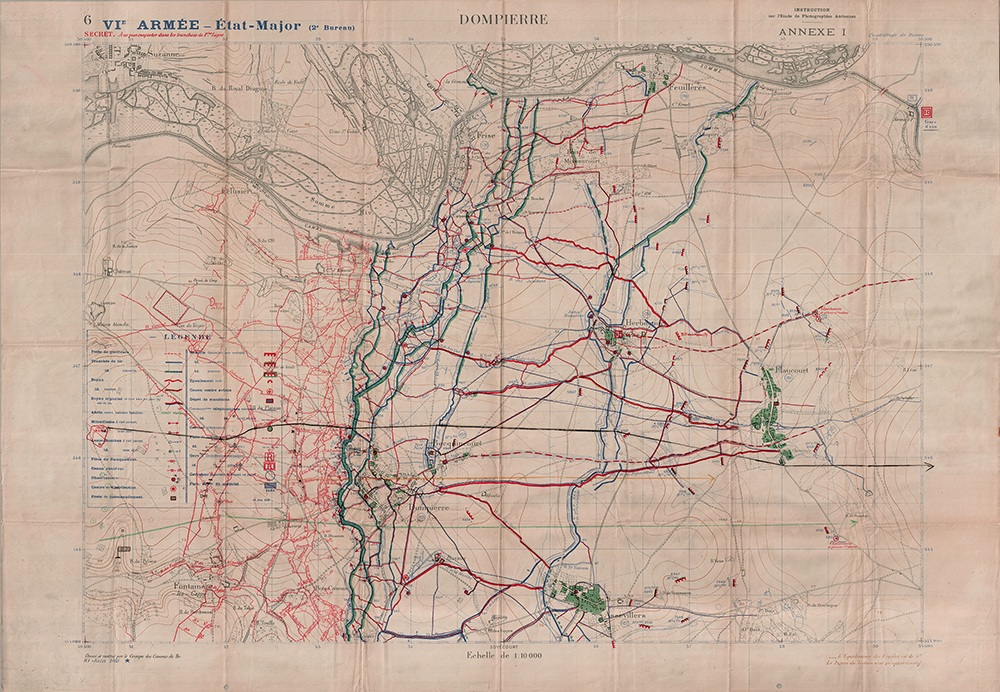
G5831 S65 1916 R39
Detailed map of the war theater on the Western Front. Indicates French and Belgian fortresses in red. Ludwig Ravenstein (1838-1915) was a German cartographer and publisher. He took over the publishing house of his father, Friedrich August Ravenstein in 1866.
D522 W37
"We were encamped on the mountain side, in caverns dug into the ice-hardened snow, around us the rugged and angry peaks of Pal Piccolo, beneath us the Pass of Monte Croce. Here is one of the vital spots in the Italian line, for it commands the Freikofel approaches, and consequently the way into the Italian plains. Where the cluster of hills reaches its highest point two crests tower above all the others, to the height of about 6,000 feet. They stand opposite to one another, running somewhat parallel along their summits, separated by a distance of about one hundred yards. One is in our hands, the other in those of the Austrians." – Luigi Barzini in "The Battle in the Snows: An Epic Story from Italy's Alpine War"
Z1221 V5 W364 1916
British novelist Hugh Walpole was unable to join the armed services because of his poor eyesight. During World War I he worked as a reporter based in Moscow for The Saturday Review and The Daily Mail. In this capacity, he visited the front in Poland. He was chastised at home for not doing enough for the war effort. In fact, Walpole had been appointed as a Russian officer in the Sanitar, a division of the Red Cross that carried the wounded out of trenches and did whatever needed to be done at base hospitals. Wrote Walpole, "They are an absolutely official body and I shall be one of the few (half-dozen) Englishmen in the world wearing Russian uniform." In a letter home he wrote, "Burying dead...is worst of all." In June 1915, Walpole rescued a wounded soldier, dragging the man to safety on a stretcher. He was awarded the Cross of Saint George for this act of bravery. Before he left for Petrograd, Walpole's novel The Dark Forest was published. It drew on his experiences in Russia, and was understandably more somber than much of his earlier fiction. Reviews were highly favorable.
D522 W37
"In order to understand the capture of Gorizia, and appreciate its bearing on the general course of the war, one must reduce the manifold character of recent Italian operations to a single concept and form a mental picture in which only the main strategic elements stand out. It helps little towards forming an adequate appreciation of our ally's great victory on the Lower Isonzo if we merely say that the Italians have advanced some five or six miles over a depth of fourteen miles and that they have taken large numbers of prisoners, together with valuable war booty. For the Isonzo line of defence is almost as important to Austria as the Rhine is to Germany; and the Italians have broken through it at its strongest point. Therefore, their victory must not be judged by the span of their advance, or the magnitude of the loss in men and material which has been inflicted on the enemy, but rather by the significance of the bare fact that the Austrian defence has been broken where it was considered unassailable." –Dr. James Murphy in "Italy's Triumph on the Isonzo: General Cadorna's Strategy Vindicated"
Private Collection
Dear Mamma,
It sure has been a long time since I've written to you but I sure have been awfully busy lately. We beat the Maybelle team Saturday 54-7 and it sure was some game. I made 3 touchdowns and kicked 2 goals. The Varsity Team beat South Dakota 20-0 in the big homecoming game. I am sending you the "Students" so you can read all about the big day.
There sure was a crowd here.
Fannie and her class of German Teachers organized a German Club and I was elected Secretary. It is to meet every two weeks and we talk German and play German games. I got A on a German paper yesterday. I received your letter yesterday. I have been so busy that I haven't written to anyone for about four days.
I guess it is getting winter here alright. The people are preparing for winter anyway. They are digging ditches around their houses and putting thick tar paper there and then banking the skirt up high. They are putting high snow fences up along all the roads and they are around most of the University.
They put the storm windows and doors on our house to-day.
I have been eating out at the Commons for about a week and like it pretty good. Fannie is going to get me a month ticket [] payday. If you board by the month it is only $3.50 per week and that is a whole lot cheaper than I can board anywhere else.
Well today is Halloween here and I suppose Carbondale is having a big time with their Pageant like they did last year. I was on crutches when they had it last year.
I guess Wilson will be elected alright. The University here are all for him but the papers say that the state will go for Hughes. Fannie says she is not going to vote. I wish I could. I can vote for the next President alright by that time I will be out of University and settled down and maybe married and living on the ranch in California but I hope not married. How is Dad? I will write to him as soon as I get more time.
Well I was sorry to hear that Sula is sick. I hope it isn't typhoid. Tell Manta and Glen Hello for me.
Well I guess I will close for this time and go to bed. It is 10 min. till eleven and I just finished writing up a Physics experiment. I will try to write again in a day or so.
With love
Bill
Private Collection
Dear Mamma,
I received your letter this morning and was sure glad to hear from you. I don't know what you think about me not writing more lately but somehow or other I've been awfully busy. The University had another big game Saturday and won 10-0. It was for the Championship of N. Dak. and was really a bigger game than the one with So. Dak. Uni. It was against the State Agricultural College at Fargo. They brought a couple of special trains and a big band and everybody celebrated it was the biggest game and best show of spirit I have ever see.
Tell Manta I got the copy of S.I.N.U. Alma Mater and sure was glad to get it and that I will write to her soon.
Well no school tomorrow on account of "Election Day" and by the time you get this letter, Wilson will be elected President – I hope.
By the papers here I see that Halloween must have been bigger than last year's celebration. I wish I could have been there to see it.
I sure have a lot of work to do tonight and tomorrow. I am going to work on Physics experiments. Do you want me to bring my trunk when I come home Xmas? I suppose I had better because I want to bring back a whole lot of stuff to eat. I get pretty tired of this eating up here. I'd rather have the beans and fries I got at Centralia, so I'm going to bring back all kinds of stuff to eat.
Well I'd better close now and write Sula a letter and then get to studying.
With love
Your Son Bill
P.S. I hope Wilson gets elected.
W.J.P.
Private Collection
Dear Sula,
I received your letter the other day and as usual was glad to get it. I have been pretty busy lately. The University won the Championship Saturday when they defeated the No. Dak. Aggies 10-0. Believe me it sure was some game. There were thousands of people. The Aggies brought two special trains up with most of students and a big Military Band.
The regular No. Dak. Quarterback got his ankle sprained in the first quarter of the game and the substitute that took his place surprised everyone by playing the whole game and made a showing even better than the reg. quarter. It sure was the best game of football I ever saw. The "aggies" had the ball on our six-inch line and the Varsity held them for four straight downs. Another time they had the ball on the two-yard line and we held them for four straight downs. Everyone sure went wild and behind me they sure done some celebrating. That night the whole student body that is the fellows got out downtown and had big snake dance. I was with them, we went in every moving picture show and even the opera house and they had to stop and watch as we yelled and made the managers make speeches and every time we run across a candidate we made him make a speech. It sure was some big time. Well write soon again and tell me all about yourself and EB. Well must quit and get to work. I have a lot of studying to do, tonight and tomorrow, we don't have school tomorrow on account of Election Day. Well here's hoping that Wilson is reelected.
With love,
Your brother
Bill
Private Collection
Dear Mamma,
Well this is Saturday night and so I have time at last to write a little bit. Fannie has gone out to the U. to a dance and entertainment but as I can't dance I couldn't go with her. She said she had to go as it was a faculty affair and that all of the faculty were expected to attend this one. I have been working all day down town getting advertisement for the Annual and getting bids for contract the engraving and printing of it. Saturday is the only time I have to work on it.
I joined the Y.M.C.A last week and pledged $5.00 to it and am going to pay it when you all send me the V the 18th. They are starting a big movement for helping the Y.M.C.A. students and teachers who are helping in the prison camps in Europe. The University State Y.M.C.A. Secretary Mr. R. Meyers, who is rooming at the house here, is going to leave next week for Europe.
The people here at the house have had a misfortune, their youngest son who is 21 was accidently killed Wednesday night by a train near Detroit, Mich., and his mother and sister are taking it pretty hard. The body is to be brought here tomorrow and they will have the funeral then. He had just written to his mother last week that he would be home this week and was on his way home when he got killed. They don't know how it happened yet. He is a traveling Salesman and was here about three weeks ago and he seemed like an awful nice fellow. His uncle, the Mayor of G. Forks, and his family have been here all evening and his other two married sisters are here and his brother has gone after the body. Mr. Olsen our coach is going to stay with me tonight so that they can have his room.
I got a letter from Sula and Dad the other day but have not got to answer them yet, but think I shall tomorrow. I see in the paper where U-High beat Anna pretty bad. We have broke up football and are going to start Basketball in a couple or three weeks. The U N.D. Football team went to Brookings So. Dak. today and I just heard that they were beaten 14-7. I guess it was on account of having three of the first team men out. One has a broken ankle, another a sprained ankle, and the other got his shoulder hurt.
Well will close for this time hoping to hear from you soon again. I am
With love
Your son
W.J. Putcamp
P.S. we are all glad that W. Wilson was elected President. It seemed like Calif. decided. Calif. went wet and Nebraska dry. Bill.
LC90 U8 O8 1917
"I can think of no time in the nation's history when the continuance of schools and colleges was more necessary than at the present time...While we are all hoping and praying for peace none may say how long this war many last, nor how urgent may be the need of our country for men of skill and education, that we may continue to prosecute this war with persevering vigor. I regard it as the duty of every young man and woman not now in the active service of the government to continue in school, in order to prepare for the obligations that are coming." – Governor Simon Bamberger, State of Utah.
D526.2 S66
After the declaration of war in April 1917 by President Woodrow Wilson, the War Department was established. Under this, the Commission on Training Camp Activities (CTCA) was formed. Its charge was to help build the then small American army into a million man force. CTCA initiated and employed many programs to do this, including "mass singing." CTCA published this official songbook which contained patriotic songs, hymns, and well-loved popular songs. Included were British, Irish, and Scottish ballads, and southern folk songs. Fifty-two short years after the Civil War ended, Northern, Southern, big-city and family farm favorites were compiled, with the idea of creating one mindset – the "American" soldier. The booklet was very successful: thousands of copies were purchased, at 25 cents per booklet, by non-military singing groups. The book was used on a daily basis in training camps throughout the nation, where competitive regimental singing became part of basic training. The booklet included such songs as "America," "The Battle Hymn of the Republic," "Abide With Me," "Dixie," "Over There," "Annie Laurie," "When Johnny Comes Marching Home," and "Old Kentucky Home." All of the songs were so well-known that it was unnecessary to include the music, with the exception of the last song, a Chippewa war song. The University of Utah copy belonged to Mervin Booth Hogan (1906-1998), who signed his name in this booklet twice.
D522 W37
"The next few weeks will witness events of stupendous importance both on land and sea. We are going to see something like that culminating scene of the 'Prometheus,' a convulsion in which earth and air and sea will be stirred and shaken to their heights and depths. The central episode will be the struggle between submarines and surface sea power, on which now depend the fate of freedom and the destiny of the world." – H. W. Wilson on "Sea Power and the Submarine: The Final Struggle That Has Begun"
Private Collection
Dear Mamma,
Well here is another week gone by and Sunday to rest up to start in next week. I received your letter yesterday and sure was glad to hear from you. My suit isn't here yet and all of the mail for to-day is in. I started wearing my B.V.D.s yesterday and I won't need any more as I have three suits. I have plenty of socks, too. We are having fine weather most of the time. This Military Drill sure is fine. We now have over 200 men out besides a squad of faculty men. We use the first part of the time in taking "Building up exercises" which is to make us straighten up and to get lots of exercise. We then drill in squads of seven men each. Each squad had a man from the Militia that was on the border, so we are getting along pretty fast. We have 250 wooden guns, but have not started to use them yet. We have to learn to march in squads and as a company first. The Varsity Baseball team drills an hour every day too. So Glen is to drill the S.I.N.U. fellows? That sure is great. I didn't suppose that he would show as much enthusiasm over the war as he has. I guess the sentiment is stronger in Illinois that No. Dak.
I still get the Free Press and that is about the only way I ever get any real news. The papers up here don't say much.
Well it is about 10:30 and I must be getting down to Fannie's room, I am to see her at 11: o'clock.
I haven't heard from Dad but will probably hear tomorrow.
With love to Dad and Manta
Your son
W.J. Putcamp
HG4936 T47 1917
D501 W47 vol. 1, no. 5
"[T]he Federal Party...made one mistake which dashed it from the heights of power to absolute destruction. This mistake was the passage of the "Alien and Sedition Acts," which removed the constitutional guarantees of free speech. These acts were administered with deadly results for the opposition Press. Petty officials, invested with draconic powers, wielded the sword of destruction as viciously as only petty officials know how to wield it. But when the next election came, the people snatched that same sword from the puny hands of its wielders, and cut off the head of the Federal Party. It never survived the operation, and its funeral ought to be remembered today by the hosts of petty officials who are hustling the Democratic Party to the political graveyard." The Western Critic ceased publication after being denied 2nd class postage privilege. Karl Schauerman was a graduate student attending the University of Wisconsin, when he began publishing this.
Private Collection
Dear Mamma,
Well here goes for another short letter to you. I received your letter last night and as usual was sure glad to hear from you. The mail hasn't come in yet this evening but it probably will before I finish this letter. I received that candy from Sula Monday night and it sure was the finest candy I have ever tasted. Lots of fellows get cakes, cookies, candy and things. I sure surprised me when I saw that it was mailed on St. and I got it on Monday.
We had inspection today by the Major General and his staff from Wash. D.C. and it sure was
some
Inspection. We (over 15 hundred of us) marched out to the Parade Grounds this afternoon and the officers came over in a car and then walked between all of the ranks and reviewed us for our clothing and soldierie appearance. And then for our drill-work. It sure was great, because he is the highest officer in the Marine Corps.
Last week we had Individual Competition drill in our Company and I was the last one to stay in ranks. They worked it just the same as an old-timed spelling match. Every time any one made a mistake he had to leave the ranks. The Sergeant drilled us for about a half hour and still there were about half of the Company left. Then he gave it up and one of the Corporals tried to catch the rest of us and he eliminated everyone but me and then another Corporal finally caught me on a simple movement. Believe me I sure felt good about it. But I guess it was just luck.
I wrote a letter to Fannie and mailed it to C'dale because she will probably be there when the letters arrives.
I haven't heard yet when our Company is going, or when Wiley and I go to the Rifle Range to train as Instructors but I suppose now that it won't be until after we finish our training. I haven't seen Thompson for three weeks to-day but I suppose he is still in the Barracks. Emmett is getting along fine now, we were together last night. He was pretty sick and disgusted for awhile but now he is gaining and weight and looks a whole lot better. Well write soon and often,
With love to all
Your son
Private Putcamp
P.S.
Could you spare me a dollar or two until payday? We get paid about the 6th of July, but I think I shall need a little before then.
Private Collection
Dear Mamma,
Well here goes for another little letter. The mail has just been called off, but none of it for me. We worked pretty hard today, that is we drilled pretty hard. But I liked the drill today fine. Yesterday and today we had Regimental and Battalion Drill. A Battalion consists of four Companys of 72 each and there are three Battalions in a Regiment, that makes 864 Privates besides the officers for each Company, battalion and Regiment. Besides that we had the Marine Band of 50 pieces. It sure was great and made everything seem more real. I was Acting Corporal in our company both days. And the Sergeant assured me today that when the company left here that I would receive my Corporal's Warrant and chevrons. That makes it a whole lot better. And anyway I have just about decided to go on with the Company. I sure would hate to see my company leave here and go to France without me. If we are sent to France, we would be sent to Quantico, Virginia first and train there for some time. Quantico is only about 35 miles from Wash. D.C. You can read all about it in the Marine Magazine. Most of the Company's leaving here lately have been sent to Philadelphia and Quantico. I had an opportunity to take a job as Post Office Clear with Walter Gowers at $40 per. Mo. but would have to stay in the Island here. If I get a Corporal's Warrant after I leave here I will get $36 and get to go to France. Even if I am sent to France it will quite a while before I see action because first we are trained at Quantico, Va. and then after we get to France we will be trained by French officers before going to the Front. I think it will be the best opportunity in the world to get to go to Europe and cross the ocean and to see some real action.
If you like the Marine Magazine and want to get it every month I will subscribe for it and have it sent to you payday. We haven't received any pay yet but will get it next Monday. I have just $27.27 coming to me, and out of that they will probably take my Liberty Bond money $10. and maybe for what gold he used to fix my teeth. I was to the Dentist's office again yesterday and have to go again Monday, and then I think I will be through and have both of my teeth filled. I can eat a whole lot better already. I wrote to Manta yesterday and sent the letter to Oak Park. Did I ever tell you that Fred Lusk, who used to be President of the Y.M.C.A. at the Normal is in the Marine Corps? He went to Chicago Uni. for the last two years and was a Frat brother of my "Bunkie", Wiley. He is training as a Second Lieut. at the Rifle Range at Winthrop Md. He and Wiley were pretty good chums at the Uni.
By the way, I told Wiley to tell his mother to send you the Negatives to those pictures, so that you could have some made if you wanted to and then send them back to her at Aurora, Ill. If you will I wish you would send me a couple of prints of each as I want to send Helen and some of my other friends some. We can't get films developed here so I will send a couple home and you can send me a print or two of each. Payday I will send some money to pay for all of these things. Those two dollars sure made me enjoy the Fourth because we could get ice cream, and cookies and Hot-Dogs and it sure was "some" celebration, too.
I saw in a Chicago paper about the race-fight in St. Louis. I suppose Company E from C'dale was up there. I am glad I am in the Marine Corps instead of the Militia or any other branch of the Service. There sure is a fine bunch of fellows down here. Well, I guess this is enough for this time so will quit hoping to hear from you real soon.
My love to Dad and the girls.
Your son
Private W.J. Putcamp
31st Company 3rd Regt.
Marine Barracks,
Paris Island, S.C.
Private Collection
Dear Mamma,
Well here is your first letter from a Marine. I have finished my nine weeks of training and am now ready for "duty." I qualified as Marksman on the Rifle Range which places me on the list of Qualified and also adds $2.00 per month to my pay. We will be awarded the Marksman's medal some time soon, which we can wear on our dress uniform. To qualify as Marksman 202 points must be made out of a possible 300. I qualified with a score of 216.
I received your letter with the pictures in last night and was sure glad to get them so that I can send to Helen and a few other friends I am writing to.
Well Mamma if I am ever going to be real homesick or feel blue it will be during the next week. You know now that we seventy-two fellows our company have come through all of the nine weeks training together and have been associated together and now are all acquainted pretty well and now the Company is beginning to break up. Our two Drill Corporals left us two or three weeks ago and now the Drill Sergeant has gone and some of the fellows are transferring to different departments and – well it makes it kind of hard to break up this way.
I am sending you a clipping that I tore out of one of the Boston boys paper. I think it is a pretty good poem.
I got a letter from Fred Lusk who is a 2nd Lieutenant in the M.C., he is at Quantico, Va. He says he likes it fine there but that it is really hot, but it couldn't be much hotter there than it is here. We have had some awful hot weather here for the last week. To-day it was 94 degrees and it was the hottest day I have ever seen, even at Mounds. We had water-melon for chow at noon and the whole Company chipped in again and we got 10 gal. of ice cream for this evening.
I am kind of anxious to see whether those pictures were any good.
I can't seem to think that I am going to have a birthday so soon and that I shall be 20 yr. old. It will seem funny to get out of my 'teens.
Well it is just about time for the bugle to sound "taps" so I must close for today.
With love to all
Your son
Pvt. W.J. Putcamp
D522 W37
"On July 28th, 1914, Austria-Hungary declared war on Serbia, and thereby set in motion the armed might of Europe. On July 28th, 1917, the "Times" confounded Germany and astonished the whole world by publishing a statement which showed that the decision to attack not only Serbia, but also Russia and France, was reached at a meeting under the presidency of the Kaiser at Potsdam on July 5th, 1914. The statement furnished the missing clue for which all had looked in vain. It cleared up many mysterious points, and it stamped an indelible brand of guilt upon Germany." – Lovat Fraser in "The Potsdam Conspiracy"
D581 D6 1917
"The real story of what the British Navy has done in the present war, including full and graphic descriptions of the Jutland Sea Fight and other engagements great and small, as well as an illuminating account of the submarine. The author was given every facility for gathering this information, and his book is as authentic as it is thrilling." Relatively unknown today, British poet and historian William Macneile Dixon was a popular writer in the first half of the twentieth century. Includes fold-out maps and charts, some in color. University of Utah copy gift of John A. Widtsoe.
D522 W37
"I consider that the first shot in the Great War was fired by an unknown German at 8:50 on the morning of Sunday, August 2nd, 1914, at a point about eight miles east of the fortress of Belfort, and about one and a half miles east of the church which stands in the French frontier village of Petit Croix." – Lovat Fraser in "Who Fired the First Shot?"
Private Collection
Dear Mamma,
I have just time to write a short letter as I have to get down and study real hard until "taps" at 9:30. Have just finished supper and have been so busy all day today that I didn't get time to answer the letter I got from you last night. I got out of the Hospital Friday afternoon. I never felt better in my life. I thought I told you what kind of trouble I had. The Doctor says it was a skin disease caused by over perspiration. The pores of the skin closed and the sweat forced itself out in blisters. It is called "Impatoga Cantagis." But now I am in fine shape and never felt better in my life. The rest sure did me a whole lot of good and I am fatter and heavier than I ever was. You see I didn't have anything to do but eat, and I was there 8 days and I sure had an awful appetite. I didn't miss a bit of drill as most of the Company was on furlough. We started in right today though. It was steady drill all day and that is what we will have from now on until we go to France.
Of course nobody knows when we will go to France, that is they can't tell us, as the transports must leave secretly on account of the Germans. When we leave we will go either to New York or Philadelphia first and will be there several days coaling and loading the trains first. When you get a letter from me, there, you will know that it will be only a matter of a few days before I go across. But you mustn't worry about me. I am pretty sure we won't leave here before the 15th and maybe I won't leave then.
You see, there are 4 battalions to Regiment and when the 5th Reg. went they sent the 1st and 2nd Battalion first and then about a month later the 3rd and 4th. I am in the 3rd Battalion of the 6th Reg. and they may do the same way.
When we do go, we will train in France all winter and won't get a chance to fight until Spring and it seems like the war will be about over by that time. But I want to fight. If I do there won't be much chance to get killed because the Marines has a reputation of winning their battles with out much loss. But don't worry about me because I am on the "right track" now and am going to stay on too.
I have been receiving the Free Presses and Y.C.'s and sure enjoy reading them.
Tell Sula that I just now got the second box of candy from her. I sure was surprised to get it and you don't know how good those cookies were. They sure are great. I can't write to her today and must close this letter pretty quick and get to studying. I have to learn some infantry drill regulations that I copied on this kind of paper. There are two sheets filled on both sides and I have to memorize it all.
I am being considered for a recommendation for Corporal's Exam next week, by the 1st Lieutenant and if I get to take the exam I sure am going to have to study.
I spent another 48 hr. Liberty in Fredericksburg yesterday and Saturday and sure enjoyed it. I took in all of the sights I didn't get to see before. It sure is an interesting place for a town of 10,000.
I haven't found any pal yet to take Wiley's place but am getting along fine without any. I am too busy anyway.
You mustn't give up coming to Wash. as I don't think I can get a furlough. I will have enough money by then to help pay your expenses. Have Dad order a pass for you and Sula and him and then all of you come if you possibly can for 1 day at least.
Well have written more than I intended too so must close now. Thank Sula again for the candy and you for the cookies. I know you made them.
With love to all
Your son
Pvt. W.J. Putcamp, U.S.M.C.
P.S. I forgot to tell you. Will you send that Army book Fannie got in N.D. right away. It will help me a whole lot.
Love,
Bill
LD5526 U55 1917
"It is evident that the great war is a war of service. It is evident that the world requires men today to give service. And it is further evident that the new world will require a still larger service. The watchword of the present is service. The watchword of the future will be service. To serve is the ambition of the University of Utah." A bulletin published by the University of Utah aimed at graduates of high school, including those wishing to serve in the war as well as attend college. The University of Utah published a similar bulletin in 1918.
Private Collection
Dear Mamma,
Well here it is Sunday morning and I am in the Y.M.C.A. waiting for church to start. I just got back from the train. The 1st battalion of the 6th Reg. left for France. There was some crowd there too. Over a thousand besides the Officers, left. Eric and White both left and I sure hated to see them go. They left by Special Train for a "port unknown" to take the transport for England. There were 17 cars besides one Pullman which had some of the Officers wives in.
I don't think that we will leave for a couple more weeks anyway. So you all must sure come here next Sunday if you can. I didn't go on Liberty this week end because I wanted to write some letters and get all of my clothes washed up. I don't think there is much chance for me to be Corporal as I didn't get to take the exam. But then I will have a chance to advance later on, so I don't mind it much.
When you come you can bring my V neck sweater and my heavy underwear if you want. Of course we (draw) heavy clothes before we leave here, but then there is no telling how soon we can get more over there.
Tell Fannie that I heard from Frank (Bucksing) from G.F., he is at Philadelphia now, in the Navy Hosp. Corps. I will probably get to see him before we leave.
Well, church is about ready to commence so I will close for this time.
With love,
Your son
William J. Putcamp
Private Collection
Dear Mamma,
Well, I will write a little bit before I go to bed. I am pretty tired tonight as we had a Battallion sham-battle at the trenches today and we sure worked hard at it.
Don't' know any more about when we are going to leave. Five Companies left this morning. Miller from DeSoto left with the Supply Company, and I suppose we will be going soon. We haven't packed the Machine Guns yet, and that is generally done two or three days before a company leaves.
I got the Free Press Youth's Companion yesterday and also the papers today. I also got a box of the best candy from Cousin Jennie. I wrote her a letter the other day and will write her another one and thank her for the candy.
I saw in the F.P. that Helen's brother died. That sure will be hard for her, because he was the one she favored most. I also read that Fannie had gone to No. Dak. and that you all had been here to see me. I can't seem to realize it yet, that you were here. I think of things every day that I wanted to ask you and tell you, but we didn't have much time. I sure am sorry that Dad didn't get to come. I was dreaming about being out on the ranch last night. Hope this war is over soon and we can all move out there and live, so we won't have to worry about anything. I tried to get one of those banners I was telling you about that says "The Marine Corps has my son," but they didn't have any more. If they get any before I leave I will send you one.
A big bunch of Marines just arrived here from Mare Island. They came on ships by the way or the Panama Canal. It took 26 days. It sure was some trip. They are put in the 8th Reg. which is begging to form. Was talking to Fred Luck and he is assigned to the 9th Reg. as 2nd Lieut. He sure wishes he could go now with us.
Well, will close now
Love to all
Bill.
Private Collection
Dear Mamma,
Well, another Sunday and we are still here. We have received orders to leave here at 12:45 P.M Tuesday. We crated our machine guns yesterday. I see in the papers that an American transport was sunk, so they may hold us a little longer.
The insurance bill was passed by Congress and I took out $10,000 worth. The premium amounts to $6.40 per month and comes out of my pay. It covers death or total disability. Of course I don't think I will get hurt, but everyone thinks it is a good thing. I will enclose a copy of the application I made, so that you can get an idea of what it is.
I just got a letter from Wiley. He has been home on a 15da. Furlough and feels pretty blue after coming back. He sure wishes he could come to Quantico and get with our Company.
Emmet and I took 24 pictures last Sunday and only 5 were good I will send you those. I got Sula's and Dad's letter the other day and will probably answer them this evening or tomorrow. I also got one from you this noon. Was sure glad to hear from you. You must write often now because letters sure will be good when I am in France. Well, this is all I will write now but will write again before we leave here and give you the full particulars of my new address.
Love to all,
Bill
Private Collection
Dear Mama,
Well, I don't suppose you have received my last letter yet but I will start another on its way. I received yours and Sula's letters last night and was sure glad to hear from you all. I sure am sorry that you hadn't heard that I arrived safely. You never have said in your letters whether you received my cards I sent while on the boat before we left the "States." I don't have so awfully much time to write and then besides one can't say very much. But I will write often so that you will know that I am getting along alright and am keeping well.
I am afraid Christmas will seem pretty dreary to me but I am hoping that before another Christmas rolls around, I am back in C'dale and the Kaiser is whipped and then I can go on with my schooling. I sure hate to miss this year of school and it seems like I hate it more than ever now. It seems like I am much older since I enlisted.
I don't think that I will get to see Mr. Kern for a long time. I wish I could find out his Company number. Tell Glen to tell me his Company number and Regiment because I may get to see him sometime over here. I wrote to Manta and he the other day. I received a letter from Jennie Dick and answered it. I sent Fannie a card or two and am going to write her a letter if I have time to-night.
I will have to close this letter pretty soon because I have said about all I can.
You and Dad must take good care of yourselves and not worry about anything. I guess I won't get to send everybody any Christmas this year, but I wish you all a merry Xmas and Happy New Year. I will be thinking of you and wishing I were with you all.
With love,
Your son,
Bill
Pvt. William J. Putcamp
83rd Co. 6th
U.S. Marnies
A.E.F.
D522 F34 1918
This poster was initially designed for a war loan drive in 1915. In it, the Kaiser sinks to his knees under the weight of allied flags. It was used again with the addition of the Stars and Stripes for the fourth war loan in 1918. Various appeals for money were made to help care for the wounded and help finance the reconstruction of formerly occupied and devastated territories. Our poster was donated by Allen V. Henrichsen, who wrote the following letter:
To Whom it may concern. To the man who handles these Books.
My name is Cpl. Allen V. Henrichsen and by special arrangement of Major Watson and Major Mumford and the commanding officer of (1st Censor & Press Co.) I am given the permission to send this book, my personal property, with the bound volumes of THE STARS & STRIPES to America.
I do not know the exact destination of these books at the present time but if the gentleman who handles these books will send me by parcels post C.O.D. at (Allen V. Henrichsen 876 So. 4th East St., Salt Lake City, Utah) or write just what I may do have them sent to me he will be conferring a great favor upon me.
Yours Very Respectfuly,
Allen V. Henrichsen
Allen Henrichsen was born on 12 Mar 1895 and died on 13 Jan. 1985. He served in the U.S. Army in World War I. He is buried in the Murray Cemetery, Murray, Utah.
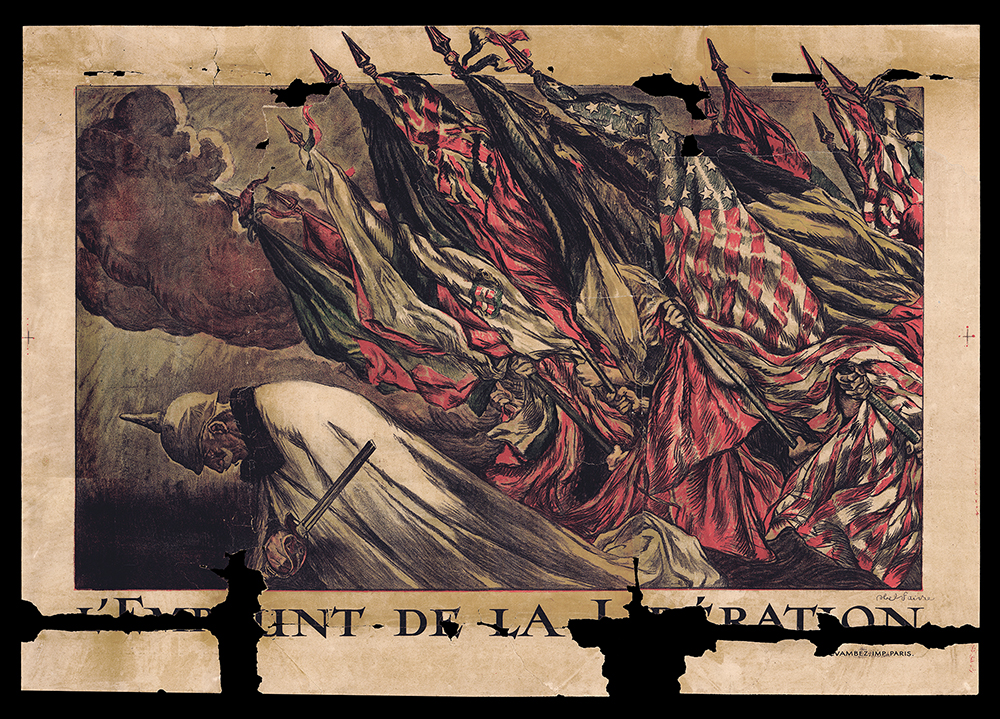
UD395 S8 S55 1918
"The soldier must appreciate that his life and the lives of his comrades may often depend upon his ability to use his rifle with effect."
The M1903 Springfield, formally the United States Rifle, Caliber .30-06, Model 1903, is an American five-round magazine fed, bolt-action service repeating rifle, used primarily during the first half of the 20th century. It was officially adopted as a United States military bolt-action rifle on June 19, 1903, and saw service in World War I. It was officially replaced as the standard infantry rifle by the faster-firing semi-automatic eight-round M1 Garand starting in 1936. However, the M1903 Springfield remained in service as a standard issue infantry rifle during World War II, since the U.S. entered the war without sufficient M1 rifles to arm all troops. It also remained in service as a sniper rifle during World War II, the Korean War, and even in the early stages of the Vietnam War. It remains popular as a civilian firearm, historical collector's piece, and as a military drill rifle. The Soldier's Handbook of the Rifle and Score Book for Special Course C..., according to the foreword, "is intended as a guide for all soldiers ... armed with the rifle, and should be used to supplement the instruction they will receive in their organizations." This handbook gives instruction on proper care of the rifle, aiming, firing positions, marksmanship techniques (such as trigger squeeze, not flinching, and making adjustments for sighting and wind), and how to shoot and properly score the Special Course C qualification range. This specific copy of the Soldier's Handbook of the Rifle belonged to Private Charlie Fults of Company B, 31st Infantry Division, who was stationed at Fort William McKinley, Luzon, Philippines at the time he inscribed his handbook. (Jonathan F. Bingham) University of Utah's copy was the gift of Charles F. Haussler.
Private Collection
Dear Mamma,
Well, there isn't anything more that I can write about but thought I had better write so that you would know that I am still well.
I see in the paper that you are all having quite a snow storm at home. I guess it must be pretty bad up where Fannie is. We get the New York Herald and Chicago Tribune here, That is the Paris edition. Of course there isn't an awful lot of news in them but we can keep in touch with home a little. I also saw that Mr. Wilson's peace terms. His address certainly was fine. I don't suppose Germany will agree to those terms but then even if he don't right now he will have to later on.
We have a new sport now. In the evenings after chow we go down to the village and get our canteens filled with milk. We have quite a time making the French understand that we want "Du Lay."
We are having it pretty muddy here now, most of the snow has melted. It sure makes it disagreeable but I suppose we will have to get used to it.
I haven't received any mail lately but expect to soon.
Well give my love to Dad and the girls and tell them I will write to them some of these days.
I am enclosing a couple of [] found in a magazine at the Y.M.C.A.
With love
Bill
Pvt. W.J. Putcamp
83rd Co. 6th Reg.
U.S. Marines
A.E.F.
D522 W37
"The Allies are "standing-to" on the western front, waiting for the great German attack which has been talked of for so many weeks. The British line, we are told at the moment of writing, is strangely silent. It is said that no such hush has been known for nearly a year." – Lovat Fraser in "'Standing-To' Along the West"
Private Collection
My dear Dad,
Well here goes for answer to your letter of Feb. I received it when I was living in a shell proof cellar in an old ruined French town and you can believe me I sure was glad to get some mail at that time. Now I am back from the front in a rest camp, and right now am enjoying the privileges of the Y.M.C.A. It sure is a great work what they are doing here. Everywhere I have been there has been a Y.M hut of some kind. At some places there was only a French Y.M. but we seemed to be just as cordially welcomed as if it had been American.
I met Banniger the other day; he is in the same battalion as I. But best of all Dad, I got to see Mr. Kearns, that was something I had been looking forward to ever since arriving here. He is a Lieutenant in the 13th Eng, and he introduced me to another Lieut. and Capt. both who knew you, but I can't remember their names. I didn't get to see him but for 5 or 10 min, but I hope to see him again soon. He sure is looking fine and especially looked good to me. I didn't get to see Vic Hundley or any of the other CDale boys. Suppose Co. C is over here by now too.
Well Dad, don't worry or let mamma worry about me. I am getting along fine and have fine health and expect to see the dear old Statue of Liberty soon. Looks pretty good to us now, the way the English are doing.
Will close now for this time hoping to hear from you soon again.
With love to all
Your son
Bill
Pvt. W.J. Putcamp
83rd Co. 6th Reg.
U.S. Marines
A.E.F.
DK251 S37
"The participation in this movement of the cooperative lends it a still greater significance, since behind it there stands the peasantry. On the other hand, the Bolsheviks and anarchistic currents gradually take possession of the Soviets of workmen's and soldiers [sic] Deputies, which is already an accomplished fact in Petrograd and goes on in many other cities. Such Soviets of Workmen's and Soldiers' Deputies assume with reference to the Government an attitude of hatred and defiance, but lose in influence within the wide ranks of the population...Altho the socialists will have in the majority, yet in union with the representatives of the liberal parties the socialists will, doubtless, he [sic] able to withstand the Bolsheviki. It must not be forgotten that the country will listen to the voice of the moderate groups whose patriotic manifestations can not fail of effect."
Private Collection
Dear Fannie,
Yes, I received your letter of March 3, about two weeks ago and was certainly glad to hear from you. I also received a letter from Speed. He seemed quite pleased to hear from me. And I am sure glad to get his letter. I also received the c-ed number of The Midget. It sure is good. Spped makes a fine Editor. I think I shall have time to write him a note today.
Well Fannie, I have reached the expectations I had when I left school about a year ago to enlist. I went through all sorts of training in the States and thought that I was really a soldier when I left for France but after arriving here I soon found out that I knew nothing of this war. But now as I said before I have reached the height of my expectations. I am really in the big game and I find it much different in all respects than I thought it was when I was a mere student reading war-articles in newspapers and magazines. I have been at the front now about a month, part of the time on the line and then several days in a rest camp and then back to the line where I am now. Can't tell you the place I'm at, but we have all read about it back there in No. Da. Little did I think then that I would ever be near such a notorious place. Fannie, one can't realize how awful this war is and what destruction it has made until you see for yourself. Almost every day I see some awful sights. Just yesterday, I was at a place where I was safe enough, but would hear the shells whistle and see them hit in a little French town. In less than a half hour of shelling, the villages was all ruins. No. I'm not sorry I enlisted and am missing a year in school I would rather be here than anywhere I know of, helping France. I do hate to have to miss going to school though and hope this is over so I can get back again to start next fall.
Take it straight from me trench-warfare is all it's cracked up to be and then some. We have it all, mud, cooties, rats, gas etc.
Must close now hoping to hear from you again. You must tell me how you are and everything.
With love
Your brother
Bill
Pvt. W.J. Putcamp
83rd Co. 6th Reg.
U.S.M.C.
A.E.F.
D522 W37
"The Germans have begun their last great offensive in the west, and on March 21st they struck with terrific force on a fifty-mile front between the Rivers Scarpe and Oise, or between the cathedral towns of Arras and Noyon. As I write, the issue of the battle, which had been raging for many days, is still desparately uncertain. From the outset it was seen that the main immediate objective of the enemy was Amiens, which possesses the finest Gothic cathedral in France." – Lovat Fraser in "The Mighty Battle of Amiens"
D515 B69 1918
Adolf Bolliger was a Swiss theologian and philosopher. He was the ninth child of a farmer. At the age of twelve he decided he wanted to be a priest. He attended school at the University of Basel and, later, at the University of Tübingen. He continued his studies at the University of Leipzig, where he received his doctorate, focusing on Immanuel Kant. In 1904, Bolliger became the rector for the University of Basel. A year later, he left to become a pastor for Neumünster. This odd pamphlet contains sermons written by Bollinger for his Swiss parishioners, calling on them to support Germany in its war efforts. Sermon titles include, "The way to peace and the obstacles in the way," "The true nobility of the German nation – and others," "The rescue," "The fulfillment," "The call of atonement by a giant," "The need for the Swiss and aiding German." The sermons are hastily thrown together in the pamphlet, with no apparent rhyme or reason to their placement. There is an air of desperation to the whole production. Bollinger's main stance seems to be that although Germany is not all that great, it looked like Americans might help win the war and then takeover once the war was won. Better to support the Germans, than that.
D522 W37
"On Sunday, April 21st, the mighty German offensive, to which we have given the name of the Battle of Amiens, had lasted for a calendar month, and had reached a brief interval of stagnation. During the previous week there had been little infantry fighting, though a great deal of mutual artillery work in the southern battlefield, which is bisected by the River Somme. In the northern battlefield, traversed by the Lys, there had been several fierce conflicts; but by the night of Friday, April 19th, there a was a definite pause." – Lovat Fraser in "The New Struggle for Calais"
Private Collection
Dear Mother,
At last I have an opportunity to write and answer some of your letters. This is the first time I have written since Mother's Day. Since then I have received letters from you dated April 15, 21, 26 and May 1. It has been almost two weeks since I have written so I hope you haven't been worrying about me. I have been back behind the lines since I last wrote. Am quite a way back now and am in a different part of the country altogether. Most of the trip we made was on foot although we rode in our old friends – Hommes 40 chevaux 8 for one day. We sure done some hiking though, twenty kilometers a day. We were in the most beautiful part of France. There was no rain and all of the country was green it sure was a wonderful trip to me. I saw Paris from the door of a box-car, that is part of the city. It sure is some city, too. I hope I have an opportunity to spend a few days there and see the town, sometime.
At one town I was billeted for about a week with some French people. It was a place where the Boche had pushed thru the lines and later on driven back. The inhabitants of the village had moved out when they heard the Germans were coming and then after the danger was over moved back in. But the French are quite progressive in a way and one could never tell that one of the big battles of the war had been fought near them. It sure is interesting to travel around the country and see so many of the places I have read about. Everywhere we are welcomed by the French people and I have learned to like them very much. I am enclosing a pansy that an old Madame just gave me out of her garden. She has a beautiful garden although most of it is used for vegetables, she finds a little room for flowers. I can hardly keep from thinking about the beautiful country we passed through while on our trip. One evening was especially beautiful. I left town with the wagon train, about 7:00 o'clock in the evening and the road was along the crest of a high hill. The farms in the valley were beautiful and then about 8 o'clock, I saw the most wonderful sunset. Those are the times when the American soldiers in France thinks of home.
I saw Vic Hundley, run into him accidently and believe me I was sure glad to see him. It was on the first night of our trip and I happened to be on watch on the train. We stopped at a town, and as I saw some of the 13th Eng., then I ask if they knew where Mr. Kern was, they told me he was out on a branch line doing some construction work and as I was returning to the car, run into Vic. He is conductor of a train and our trains happened to meet at the town. He asked about Buster and I told him you and Sula was taking good care of him. It sure was great to get to see Vic. Don't expect to get to see any more of that bunch as I am in a different section of the country now.
I saw in the papers about the Presby. Meeting, also the article about me it sure was written up well. Eric is only 3 kilometers from here and I am going over to see him tomorrow. I have seen Miller quite often lately.
I relieved the Baseball book from Sam and Carl and will drop them a line right away.
I suppose you saw the write up in the St. Louis and Chicago papers about we Marines when at the front. Several of the fellows have received the clippings already.
I received the pictures of Glen and they sure are good also received Dad's, Manta's and Sula's letters. Will answer them as soon as I get some time. Well keep writing often and don't worry about me. I am getting along fine. Am already gaining back what weight I lost while in the trenches.
Love to all the family and regards to my C'Dale friends.
Your son
Bill
Pvt. W.J. Putcamp
83rd Co. 6th Reg.
U.S. Marines
American E.F.
D570.85 U8 P4 1918
"The booklet gives a brief summary of facts to show the loyalty of the 'Mormons' to the government, their belief that the Constitution of the United States is an inspired instrument, and lays stress on the fact that Utah has always been true to the Union...the war work of the Woman's Relief society, the Y.L and Y.M.M.I.A and Primary associations outlined in full, together with the Church's subscription to Liberty bonds." – June 21, 1918, Deseret News.
PS3515 U1413 A65 1900z
American humorist Frank McKinney Hubbard, the son of a newspaper editor, created the cartoon character "Abe Martin" in 1904. Drawings of idle rural personage, accompanied by dry drawls of pithy sayings appeared on the back page of issues of the Indianapolis News. Annual collections of these cartoons appeared in book format from 1906 until Hubbard's death in 1930. In 1910, the cartoons were syndicated and read in newspapers by Americans all over the country. "Abe Martin" became so popular that the image was used commercially to advertise cigars, cookies, overalls, pencils, whiskey, and other goods. University of Utah copy gift of Janet B. Lear, 1988.
Private Collection
My dear Mother,
Just a few lines now so you won't worry. This is the first opportunity I have had to write a word since I last wrote, and I don't know for sure whether I can get this off very soon. But I am doing the best I can because I don't want you to worry a bit about me. I have certainly been kept busy and have had some exciting times during the last fifteen days.
You know by the papers what I have been busy at and believe me we "Marines" have been real busy.
Mother I am sure proud that I am a Marine and I know that you are as proud as I am.
I have certainly had some wonderful experiences and will tell you about them when I write later. I will soon be where mail can be censored and mailed more readily.
I came through the big scrap in fine shape but we are all ready for a good rest. I got hit once in the leg by a machine gun bullet but it didn't amount to anything. It was only a trifle and more kept me off my feet a minute. It is almost completely healed up now. I never missed out a day with the Company so you don't want to worry about it. We got some mail today and I received your letters dated May 10, 12, 14, and 19th. Also the papers and razor blades. Was sure glad to get your letter too. Also received letters from Sula, Dad, Manta, Fannie, Jennie, Helen and Hazel. Sure was great to get all of those letters. But best of all were the pictures of you all. They sure are great and they are the only ones of you folks that I have with me now.
Well, I can't write any more but will soon have a chance to answer all of my mail. Give my love to Dad and the girls and tell them I will write to them all right away,
With love
Your son
Bill
Private Collection
Dear Mother,
Well sooner than I expected I have another opportunity to write. Am sure sorry that I didn't have an opportunity to write oftener lately but we were called to the front suddenly and and have sure been kept busy. When I wrote yesterday it was the first chance I had since I last wrote in May.
It has been open warfare this time and it sure was awful. Certainly hope this war is brought to a close soon. Suppose you have been reading about the battles we have been in. It isn't that I'm afraid or anything like that but you know the reason you said I could never learn to be a Doctor. It sure was awful but I stood it better than I thought I could. But as long as I can't tell in detail about the two weeks fighting in the mail I'll wait until I get home to tell you about it. I want to forget about it for a while and rest. Don't think I shall forget about any of it before I get back, because it was something I shall always remember.
Haven't even seen any Stars and Stripes lately but when I get a chance, I will send some more home. Those pictures Sula sent sure are great. I will keep them with me all the time now.
Am sure glad to hear that your garden is doing so well. Wish I could help eat some of the things.
You were right about where you thought I was in the trenches some time ago. I am quite a ways from there now though. I saw that article in the paper about the transport and also that letter of mine.
Hear from Odess, Ruth and George and will answer those letters when I have more time.
Dave Entinger is in our Company now. Sure was great to be with someone from C'dale. Of course I didn't know him but I know Bob and Tom so well.
You mustn't worry about the "coodies" as you call them. They are getting to be one of the minor Honors of War.
Was sorry to hear that Sula was sick but hope she is well now. If Grandpa is still there tell him Hello for me and that I hope to be back to see him soon.
Well must close now.
Write real often. I'll write whenever I can.
With love to all
Your son
Bill
Pvt. W.J. Putcamp
83rd Co. 6th Reg.
U.S. Marines
American E.F.
D522 W37
"It is not too much to say that in the St. Quentin Battle the Royal Artillary at many points did a great deal towards saving the Fifth and Third British Armies from serious defeat." – Hamilton Fyfe in "How the Gunners Saved the Day"
Private Collection
Dear Mother,
Just a few lines today as I am up at the front again and have just a few minutes to write. This is my first opportunity since I last dropped you a note over a week ago. Then I was back a little ways in a Support Camp. This sure is fast life up here at this front and it sure has been fast for almost a month. Extremely long time for anyone to be kept at the front, too, but I guess it's necessary in this case. The Y.M.C.A. and Red Cross have been treating us fine up here lately. Whenever it has been possible they have sent cakes, chocolate and smokes to us. They also got some meat to us. But it is pretty difficult to get much of anything up on account of constant shelling. So you see we appreciate every little thing we get very much. I think I have received all of my mail from you up to May 28. The papers and letters were doubly appreciated too. The latest Free Press I have received was dated June 7. It gave a short account of the first attack we made at this front. Am anxious to get the latest papers and see what they say. I have seen the war in its worst possible form. We have no trenches. When we advance, the first opportunity finds us digging holes in the ground just big enough to get in. This is for protection from shell-fire. I have lived in these holes since June 1, eat, sleep and everything. As for the fighting, you have seen in the papers of the advances we have made, of the prisoners we have taken and of our casualties. Those things are
[page missing due to censor]
this month and they were to you. No. I believe I dropped a line to Helen and Manta. From what I have seen of the Boche prisoners we have taken I think that this war is practically over. What the Italians are doing to Austria strengthens that too.
Well Mother you mustn't worry about me, but the time you receive this letter I will be all rested up and will have written several letters to you. That was a good article about the Marines you sent me. Am sure glad that I am in the best fighting troops in the world.
Must say good bye now
Love to Dad and the girls
Your son
Bill
Pvt. W.J. Putcamp
83rd Co. 6th Reg.
U.S. Marines
American E.F.
D526.2 S719
Published in France by the Stars and Stripes, the official newspaper of the American expeditionary forces. Anonymous poetry from American soldiers serving on the Western Front, dedicated "To the Children of France."
"Me, that hollered for water,
With a splinter o' hell in my side;
Me that have laid in the sun a-cursin' the beggars and stretchers
As looked like they'd never a-come;
Me that found God with the gas at my throat
An' raved like a madman for Maggie,
An' wanted a wooden cross over me!
Me – an' Slim Jim back o' me singin',
An' tracin' a name in the fade o' the Stars!
Me – knowin' that some'll be ridin' that's walkin' tonight –
Knowin' that some'll never see Broadway again,
An' red wine,
An' Little Italy,
An' Maggies like Mine, --
Me! – a-murmurin' a prayer for Maggie
An' stoppin' to laugh at Slim
An' shoutin' "To the right o' the road for the Swoi-zant-canze!"
Them babies that raise such hell up the line,
An' marchin',
An' marchin' by night,
An' marchin' by day,
An' France,
An' red wine,
An' me thinkin' o' Home,
Me – a-leadin' a column, --
An' War goin' on!
from "Me, -- An' War Goin' on!" John Palmer Cumming, Inf.
D522 W37
"The Canadians were not 'in the big show.' I heard many of them say this regretfully. They wanted to be in it. They chafed against inaction while not far from them the great battle was being fought. They were doing good service, but it was the service of those who 'stand and wait,' and that is not the kind of service to which the Canadians are accustomed. "If only the Boche would start in on us!' they said. They meant it, too." – Hamilton Fyfe in "What Canadians M.M. Gunners Did"
Private Collection
Dear Mamma,
Just a few lines now as I have another opportunity the first since I last wrote. I have been up to the lines again and wrote a letter to you then that I just mailed. Have received so many letters up here that it will take me some time to get caught up with my correspondence. The latest letter I received from you is dated June 12 and I got that June 29. That sure reached me quickly. Am glad to hear that you received my "Mother's Day" letter so quickly. Was glad, too, to hear that you received that "request" and now I can look forward to getting the box – we can't even send requests anymore.
Hope it wasn't much trouble to get the things. My but I sure will appreciate the things when they get here.
Heard from Frank Hesler the other day and he sent me a picture of his family. Tell Dad I received his letter of May 21 and sure was glad to hear from him. Am going to write to him a little later on. Am also going to answer Sula's letter soon. Gee but it sure is great to hear from you all. I owe Manta and Fannie each a couple letters, and I also heard from Jennie again. It sure is quite a hard job to write very many letters over here but I try to answer all I receive so I can keep hearing from everybody.
I hope you haven't been worrying about me, while reading the papers about the Marine's fighting. I was right there in the thick of it all the time but thanks to Providence a few of us come out alright. We sure made "Heinie" step through.
Mother, this war and these battles are surely awful but when we think of what those Huns did in Belgium and to our ships it makes you willing to go through anything.
Thank God I'm American and not German. But I'm proud of the German blood in me because I think a German American is the best American.
Must close now with lots of love to Dad and the girls.
Love
Your son
Bill
Pvt. W.J. Putcamp
83rd Co. 6th Reg.
U.S. Marines
American E.F.
LC90 U8 O8 1917
"To place before the public, in a way best suited to local conditions, information concerning the issues for which the United States is at war, ways and means adopted for prosecuting the war to a successful conclusion, duties of our citizens with respect to these activities, direct and indirect assistance to be given auxiliary organization, and the relation of our people to both civil and military branches of governmental work."
Private Collection
Dear Fannie,
Sunday afternoon and at last I find time to answer your letters. I have received two since I last wrote to you. They were dated May 13 and June 9. I received them both while in the front line and I was certainly glad to hear from you. As you said in your last letter, you saw the papers about us stopping a drive in Paris and gaining ground by driving. I can't say any more about our work up here than the papers did or as much, but it surely was an experience. It was all the old American or open warfare, except that whenever a move was made, we had to dig in. For over a month I have lived in these small dugouts they are just large enough to lie in and the depth depends on how bad one wants to live. They are for protection from shell-fire and you may be sure my dug outs have always been plenty deep. This certainly has been a great experience up here but it sure has been horrible. Can't tell you of the horrors except that I've changed "bunkies" about six times and I've had as many opportunities to "go west," or get "blighties" myself. But its "Providence" and I've been pretty lucky.
By now your school is out. I wonder what you
"Somewhere in France"
06 August 2018
21st birthday
Private Collection
Dear Mamma,
Well at last I have an opportunity to drop you a few lines. I have been in the Hospital for gas ever since Sept. 14, but am getting along fine and expect to be back in the Company real soon. I suppose by the time you receive this letter you will have received notification from Washington that I was slightly wounded. I hope you haven't been worrying about me. It was in that 1st American Army drives in the St. Mihiel salient. They were dropping "high explosions" and "gas-shells" on us, and one of the H.E.'s hit pretty close to where my bunkie and I were dug in, it knocked us out, then some gas-shells dropped around us and the next thing I knew I woke up in a big Hospital and then I suffered with a liquid diet for five days. That was the worst part of the whole experience. But they finally did begin to feed me and I am feeling fine now. I lost everything I owned this time except my little bible you gave me and some pictures of you I had in it. I haven't had any mail since I left the Company and won't get any until after I'm back for awhile. When one is sent to the Hospital everything gets all mixed up and it takes some time to get straightened out.
I certainly am anxious to get back so I can get your letters.
Well it has been just about a year since I saw you and the girls at Washington but by the way we are walking all over Fritz I guess it won't be long before I'm back there and get to see you all again. It sure will be a great day for me when I see the Statue of Liberty in N.Y. harbor again.
Well, there isn't much more I can say this time, so will close, hoping you won't worry about me. I'll write again as soon as possible.
With love to Dad and the girls and Grandpa
Your son
Bill
Pvt. W.J. Putcamp
83rd Co. 6th Reg.
U.S. Marines
American E.F.
Censor's signature OK Rob Whidden Capt. US Inf
D646 S46 1918
Special unnumbered issue of the Salt Lake Herald, issued November 11, 1918, announcing the armistice.
D639 W2 P277 No. 1
"Mrs. J. G. Falck was the founder of the Women of American Patriots, which had its inception November 9, 1917, at the home of Mrs. David Eccles. The spacious parlors were overflowing. At the close of this meeting it was found that there were women present who were not of Battery B whose hearts were sad over their departed loved ones and whose sympathies linked them with the organization. In consequence the next meeting welcomed mothers, wives, sisters, sweethearts and the women nearest of kin to the boys in service of the United States. A committee on Constitution and By-Laws reported and the 'Women of American Patriots' was launched in proper form. From that day to the present there has been a continuous growth in interest, attendance and usefulness. They adopted as a motto, 'Watch, Work, Wait, Win,' and as their object, 'Mutual Helpfulness.' As a body of women they have been able to fulfill their purpose and have been able to offer to the government some plans which have not been worked out by any other organization." -- November 15, 1918, Christmastide Edition Number One. Edited by Katherine. S. Knisely.
D522 W37
"That glorious week which ended October and ushered in the first days of November was in many ways the most wonderful week of the war. It crowded decades into hours." – Lovat Fraser in "The Week of Destiny"
Private Collection
Dear Dad,
Well, here goes for a Thanksgiving Day letter for all you folks at home. This is the first time I have had a chance to tell you where I have been and what I have done while over here. But now the censorship is just about lifted, I guess. I can tell you some of the things you all have been wondering and wanted to know about me.
To begin with I came across the ocean on the transport Von Steuben which was formally the German raider (Kaenprinz) Wilhelm. The trip across was uneventful until the last few days. On the 9th of November our ship rammed one of the other transports and it tore quite a hole in our bow and put all of our starboard guns out of action. Both of the ships were smashed pretty bad. From then on we had to travel pretty slow. The next night we were attacked by a submarine and had a very close call. On the morning of Nov. 12th we steamed into the harbor of Brest, France and land sure did look good to me.
From Brest we rode box cars to Bordeaux. There we worked with some Railway Engineers until about the 7th of Jan., when we went up into the central part of France to a town named Chamont La Ville. It was there that we had intensive training until about the 10th of March. We then went near Verdun and took over the Verdun Sector.
It was a very quiet sector when we first relieved the French there, but as we were the first Americans in that sector it soon livened up. There was a great many interesting things happened while we held that sector that I'll get to tell you all about sometime.
We were relieved from the Verdun sector about the middle of May, and from there went to a small town near Bar Le Duc, France. It was from there that we were called to Chateau-Thierry and from then on we have been in active fighting. We arrived, on French trucks, at a place near Chateau Thierry on June 1, and from that time until June 6 we had our hands full stopping the Boche, it was some job too. On June 6th we started our counter-attacks and from then on until we were relieved July 16 we sure lived the life of Riley. From there we again took French trucks to a place on the line a short ways south of Soissons where on July 18th we began the big counter-drive. We were relieved from there about a week later and after a series of hikes and train rides we arrived at Nancy, France, which is a town of about 200,000 a week or so later we took over the Toul sector.
The Toul sector was sure a quiet sector too, but we weren't in there long. We were soon relieved to prepare for the big First American Army drive at St. Mihiel. We started it on Sept. 12 and on the 14th I got my dose of gas. I was evacuated to Base Hospital 45 at Toul and after about a week there was sent to Base 36 at Vittel, France. Was sure treated fine at the Hospitals but suffered quite a bit for the first couple weeks.
I got back to my Company just in time for a long hike up to the Champagne front. From there we rode Camions and hiked until we jumped off for our final drive on the Argonne front, the 1st of Nov.
We were on the Meuse river preparing for attack when the armistice was signed on the 11th. It sure was a happy day. On the 17th we started on the trip I am now on, following up the Germans to the Rhine. This has certainly been a very interesting trip so far. We have hiked during the day and at night we billitted in the people's homes. We crossed a part of Belgium and then through Luxemburg to where we are now on the German border. The first few days we were here we could look across the river and see German troops on the roads. They wave to us and one would never think that just a few weeks before we were bitter enemies.
Well, I have told you a few things about where I have been and what I have been doing. Believe me the 2nd Division has seen service and it is the best division in the A.E.F.
Suppose by the time you receive this letter it will be Christmas and you'll be celebrating and wonder how I am spending the day.
Don't know when we'll sail for home. We are hoping it will be soon but don't know. I suppose by the next time I write it will be from Germany. Well a happy and most merry Christmas to you all and lots of love.
Your son
Bill
Pvt. W.J. Putcamp
83rd Co. 6th Reg.
U.S. Marines
American E.F.
BX8639 W44 W67 1919
"What will be the outcome of it all? Is the world to be made safe for Democracy or will it be ground under the iron heel of an autocratic despotism? That such a calamity is in store, I cannot believe; that He who in the beginning instituted laws for man's advancement will tolerate the enslavement of the human race and such a turning back of the wheels of eternal progress, I cannot believe...A greater warfare in in progress than now shakes the shores of Europe, a warfare whose beginning was coeval with the foundation of the world; for greater than any strife between man and man, is the world-old controversy between God and Satan, between freedom and oppression, between good and evil, between right and wrong. And right will triumph, and God will be glorified, if all the works of man go to pieces in the process." Orson Ferguson Whitney, born in Salt Lake City, was a member of the Quorum of the Twelve Apostles of The Church of Jesus Christ of Latter-day Saints. His father set type for the original publication of the Deseret News and worked for that newspaper as a printer for twenty-one years. Whitney was a journalist, a historian, and a poet. He taught English at Brigham Young College in Logan, Utah. He began his writing career with the Deseret News, working as a reporter and later as the city editor. On a mission from 1881 to 1883, he edited the Millennial Star. Whitney wrote lyrics to LDS Church hymns. He wrote well-researched historical works with a Mormon perspective.
D522 W37
"A Sabbath peace was on the green, lonely land. In the bright frosty air church bells were calling the peasants to Mass in the Ardennes and the Eifel, and the churches were filled, and the woods and fields empty on Sunday, December 1st, 1918, as the British Hussars and Lancers crossed the German frontier. Ahead of the conquerors rose ridge after ridge of high, pine-crowned uplands, with roads running by the edge of green ravines and by pleasant timber-built farmhouses, standing blank and sullen, with closed doors and blinds drawn." – Edward Wright in "What the British Army Has Done"
JX1975 D73 1919
"In order to promote international co-operation and to secure international peace and security by the acceptance of obligations not to resort to war, by the prescription of open, just and honourable relations between nations, by the firm establishment of the understandings of international law as the actual rule of conduct among governments, and by the maintenance of justice and a scrupulous respect for all treaty obligations in the dealings of organized peoples with one another, the Powers signatory to this Covenant adopt this constitution of the League of Nations."
Private Collection
Dear Mother,
Well, I found out all about being discharged last night. We will be mustered out next Thursday. That is quite a bit sooner than I had expected so I will be at home Sunday or Monday, isn't that great? Can hardly realize that I'm actually here in America. We get paid our five cents a mile to place we enlisted but don't know about the 60$ bonus. Some say we will get it here and others say we won't get it until after we get home. No one seems to know about the bonus. I kind of think we will be paid in full here, though.
I'll have to get my uniform tailored a little to fit me for I want to look good. And then I'm going to buy a cap, the issue campaign hats but they don't go very well with greens. I don't suppose I'll wear the uniform very long for I want to get back to civilian clothes. My but they are going to cost a lot, everything seems so awful high over here.
If you can spare 25$ I wish you would wire me that much right away so that I will get it before I leave here. Will probably start Thursday night or Friday. I may not need it all, but I want to make sure I have enough. But don't send anything unless you can really spare it.
Don't know which road I will come in yet but will let you know by wire as soon as I get started.
Well must close now and take a detail to draw some more clothes at the Quartermasters.
Lots of love to all
Bill
D522 W37
"To the student of history who takes a large view of human affairs the connection of what has happened lately with the events of the past needs no pointing out. But as it is impossible for all to be students, and as, moreover, of those who have studied history, only a small proportion are able to 'see it steadily and see it whole,' it is worth while dwelling for a little while upon that connection, and showing why this is the particularly interesting moment in the development of the European peoples." – Hamilton Fyfe in "Twilight of the German Gods"
D525 B63
Randolph Bourne, a graduate of Columbia University, wrote this bitter essay in June 1917, a few months after the United States entered the war, for the magazine, Seven Arts, lambasting fellow intellectuals for jumping on the pro-war bandwagon. "A war made deliberately by the intellectuals! A calm moral verdict, arrived at after a penetrating study of inexorable facts! Sluggish masses, too remote from the world-conflict to be stirred, too lacking in intellect to perceive their danger!...An intellectual class, gently guiding a nation through sheer force of ideas into what the other nations entered only through predatory craft or popular hysteria or militarist madness! A war free from any taint of self-seeking, a war that will secure the triumph of democracy and internationalize the world!" From the colophon: "Twenty four years ago this June, Randolph Bourne published in The Seven Arts his stirring essay "The War and the Intellectuals." In honor of the first presentation of the Randolph Bourne Award and of the Fourth American Writers Congress held under the auspices of the League of American Writers, Inc., this limited edition of the essay is printed as a keepsake by Robert L. Leslie. Reprinted from UNTIMELY PAPERS. Copyright 1919 B.W. Huebsch, by permission of The Viking Press."
E185.93 T4 G68 1989
"Go tell Billy Kaiser
what Woodrow Wilson said
He was not going to stop fighting
till they killed him dead
Go ring the liberty bell
and give old Kaiser room in hell
after a few weeks of fighting hard
Billy Kaiser's flag had fell
The War is on
The War is on
Let everybody get ready
for the War is on"
The memoir of an 80 year-old African-American woman from poverty-stricken East Texas, including a collection of "Family Rhymes & Poems." Six parts letterpress printed on Root River Mill abaca paper dyed a different color. Each part is bound on vellum tapes. These pieces and an accompanying cassette tape are encased in a white handmade paper envelope with a purple paper pulp stripe running through it, tied with twine and secured by a printed paper label. Edition of seventy-five copies.
UB855 G7 H36 2007
This book contains three war stories, written in German, including a piece about British soldiers serving in World War I who were court-martialed for cowardice in the face of the enemy and shot by their comrades. In 2006, the men were pardoned. The complete text of an article about the pardon from the German Press Agency is printed on the front of an altar-fold. The two flaps of the altar-fold contain the letters "G" and "S" representing the word "gnadenlos" or "merciless." Inner pages with red text are revealed as the two flaps are opened. A statement, titled "State-ordered Murder, called War," on the two flaps include footnotes proving the incompetence of the High Command. The banderole, printed on French toilet paper, represents the blindfolds of four French soldiers who were court-martialed in 1915 and shot in the back and includes a wood engraving of a French Military Cross on the front. Handprinted eight-page altar-fold and card with a poem by Siegfried Sassoon, "Glory of Women." A pictorial supplement with translation from German to English is included. Swiss typographer Romano Hänni experiments with unusual compositions of letter forms and symbols in reaction to social issues. Edition of three hundred and six copies.
The French government awarded 5th and 6th Marines the fourragère for actions during World War I. To this day, they are the only Marine Corps units authorized to wear it on their uniforms. The units also earned the Croix de Guerre with two palms and one gilt star for their actions in several battles including the Battle of Belleau Woods. In 1918, the 5th and the 6th Marines fought in three separate battles as part of the Marine Brigade of the American Expeditionary Force. The Regiments were permanently awarded the French fourragère to wear and maintain on their uniform for all time.
This fourragère belonged to William Jennings Putcamp, 2nd Division, 4th Brigade, 6th Regiment, 3rd Battalion, 83rd Company, United States Marine Corps.
Corporal Putcamp was in active operation against the enemy:
March 15th to May 15th, 1918 – Verdun sector
June 1 to July 16th, 1918 – Chateau Thierry sector
July 19th to July 23rd, 1918 – Soissons sector
August 7 to August 14th, 1918 – Marbache sector
September 12th to September 20th, 1918 – St. Mihiel sector
September 29th to October 10th, 1918 – Champagne sector
October 16th to November 11th, 1918 – Meuse Argonne sector
November 17th to December 12th, 1918 – March to Rhine
December 10th to July 4th, 1919 – Army of Occupation, Coblenz
On loan from the collection of Maximilian Novak Niketić.
